 16/10/2009 23:25 16/10/2009 23:25 |
|
| | | OFFLINE | | Post: 18.650
Post: 1.298 | Registrato il: 28/08/2005
Registrato il: 20/01/2009 | Administratore | Utente Veteran | |
|

 Earlier posts for 10/16/09 on the preceding page.
Earlier posts for 10/16/09 on the preceding page.

 Robert Moynihan, who edits INSIDE THE VATICAN magazine, has changed the format of his Newsflash to a more flexible blog called THE MOYNIHAN REPORT.
And so it begins...
Robert Moynihan, who edits INSIDE THE VATICAN magazine, has changed the format of his Newsflash to a more flexible blog called THE MOYNIHAN REPORT.
And so it begins...
Formal theological discussions on Vatican II will begin later this month:
Why Benedict XVI is allowing this new debate on the most vexed questions of Vatican-II
By Robert Moynihan, reporting from Rome

"The first real task of the Council was to overcome the indolent, euphoric feeling that all was well with the Church, and to bring into the open the problems smoldering within."
— Father Joseph Ratzinger, in a talk on the Second Vatican Council, Oct. 1964, while the Council was still in session (he was then 37 years old and a peritus or "expert" at the Council; see www.commonwealmagazine.org/blog/?p=935)
"What has happened since the Second Vatican Council can, according to Cardinal Ratzinger, be described as a cultural revolution, considering the false zeal with which the churches were emptied of their traditional furnishings, and the way that clergy and religious orders put on a new face. That 'rashness' is already regretted by many, the cardinal contends. There was, he believes, a 'widening gulf' between the Council Fathers, who wanted aggiornamento, updating, and 'those who saw reform in terms of discarding ballast, a more diluted faith rather than a more radical one...'"
— The Tablet, April 19, 1997, reviewing the book Salt of the Earth, a book-length interview with German writer Peter Seewald (conducted when Ratzinger was in his late 60s)
"After the Second Vatican Council, the impression arose that the Pope really could do anything in liturgical matters, especially if he were acting on the mandate of an Ecumenical Council. Eventually, the idea of the givenness of the liturgy, the fact that one cannot do with it what one will, faded from the public consciousness of the West.
"In fact, the First Vatican Council had in no way defined the Pope as an absolute monarch. On the contrary, it presented him as the guarantor of obedience to the revealed Word. The Pope's authority is bound to the Tradition of faith..."
— Cardinal Joseph Ratzinger, The Spirit of the Liturgy, 2000 (published when Ratzinger was 73 years old)
Pope Benedict XVI has just made a dramatic choice, one which will certainly be numbered among the major decisions of his pontificate.
He has decided, in effect, to reopen formal debate on the Second Vatican Council and its teaching.
The new dialogue, which will take place in Rome between the leaders of the Fraternity of St. Pius X (the followers of the late Archbishop Marcel Lefebvre) and Vatican experts will take place on October 26 at the Vatican, Jesuit Father Federico Lombardi, the Vatican spokesman, said today.
(Here is a link to a full report on the announcement:http://www.catholicnews.com/data/stories/cns/0904605.htm.)
====================================
For the Pope's critics, the decision is unwise, as it seems likely to open a large can of worms.
These critics have argued that the lid on this can should be kept tightly closed. In essence, they have advised the Pope not to "dignify" the Society's objections to certain conciliar teachings -- or to the interpretations of those teachings -- by granting such a formal dialogue.
But Benedict has decided to let the dialogue begin.
For the Pope's supporters, the decision is an occasion for praise.
Why?
Because the Pope, almost five years into his pontificate, has finally decided to face head on and "bring into the open" the doctrinal problems "smoldering" (to cite his own words of 45 years ago) just beneath the surface of Church life throughout the entire post-conciliar period (1965 to the present, or 44 years).
So, with this decision to engage in a dialogue about the Council, a very significant phase of Benedict's pontificate begins.
Because this dialogue will inevitably come to grips, more than a generation after the close of the Council, with profoundly important doctrinal issues -- issues which seriously divided the Council Fathers at the time of the Council, and which eventually, and tragically, led:
(1) to a formal schism* between those whom we may call "traditionalists" and "progressives" (though the two terms are woefully inadequate) when in 1988 the bishops of the Society of St. Pius X (the Lefebvrists) were excommunicated, and
(2) to widespread confusion among the Catholic faithful, to many exaggerated and erroneous interpretations of Christian and Catholic identity, and even to the formal or de facto abandonment of the Catholic faith by many.
*[But there never was a formal schism! And in any case, there cannot be a schism between two groups that coth consider themselves still within the Church - schism is usually a breaking away from the main Church by a dissident faction.]
With Benedict's decision, the Second Vatican Council is, in a certain sense, as it were, being called in "for further questioning" -- for an new examination and cross-examination, like a witness in a trial, to determine what the Council actually said, and intended.
And this means that theology, the strong point of this "theologian-Pope" (his career before he was consecrated a bishop was as a professor of theology in Germany), is about to take center stage in Benedict's pontificate.
And the goal in all this will be to arrive at clarity and a common understanding of the faith which will allow the reunion of the Lefbevrists with Rome, and so end of the only formal schism since Vatican II. [I do not know why Dr. Moynihan repeats this error. The strongest term used by the CDF and by Ecclesia Dei to describe Mons. Lefebvre's movement was to call if 'schismatic', always qualifying it to say there was no formal schism.]
But we will not be able to observe this crucial theological debate. It will take place behind closed doors.
[Moynihan then quotes Fr. Lombardi's announcement yesterday of the start of talks and the simultaneous bulletin from the FSSPX officially naming the members of their counterpart theological commission for the discussions.]
Some Additional Background
In a recent interview granted to an FSSPX magazine in South Africa and picked up by Reuters, Bishop Fellay spelled out his view of the issues to be raised during the upcoming dialogue.
“The solution to the crisis is a return to the past,” Fellay said.
He said Pope Benedict agrees with the FSSPX on the need to maintain the Church’s links to the past, but still wants to keep some reforms of the Second Vatican Council (1962-1965).
“This is one of the most sensitive problems,” he said. “We hope the discussions will allow us to dispel the grave ambiguities that have spread through the Catholic Church since (the Council), as John Paul II himself recognised.”
Here is a fuller report on the interview, with some interesting comments attached:http://blogs.reuters.com/faithworld/2009/10/13/return-to-past-is-sspx-motto-for-doctrinal-talks-with-vatican
One Issue: The "Subsistit" Clause
(Note: I draw most of the following material, which I condense and edit here, from an article by Anthony Grafton published in The New Yorker, July 25, 2005, which may be found here: www.accessmylibrary.com/article-1G1-134469260/reading-ratzinger-cardinal-jose... The point Grafton focuses on below will certainly be among the points discussed in the upcoming dialogue.)
In May, 1984, Cardinal Joseph Ratzinger summoned the Brazilian theologian Leonardo Boff to Rome.
At the time, Ratzinger was the Prefect of the Congregation for the Doctrine of the Faith.
When Boff arrived, Ratzinger questioned him on relations between the Catholic Church and other Christian denominations.
Boff replied by citing Chapter 1, No. 8 of Lumen Gentium ("Light of the Nations"), one of the key documents of Vatican II, which sets forth the Church's understanding of her own nature.
Lumen Gentium in one well-known passage of considerable importance for ecumenical dialogue with Protestant Christians, teaches that the true Church "subsists in the Catholic Church, which is governed by the successor of Peter and by the bishops in communion with him. Nevertheless, many elements of sanctification and of truth are found outside its visible confines."
Boff -- like many others before him and after him -- interpreted this passage as teaching that the traditional teaching that the Catholic Church is the "one true Church" founded by Jesus Christ had been qualified by the Council and so, in effect, slightly altered.
Did those who drafted the document have this view? That is a vexed question.
For the first two years of the Council, the draft document stated simply and directly that the mystical body of Christ "is" the Catholic Church.
But in the fall of 1964 the word "subsists" ("subsistit" in Latin) was added, along with the passage about elements of truth being present outside the Church.
The official commentary explained that the change was meant to make the text "more harmonious with the affirmation of ecclesial elements which are elsewhere."
The Dominican theologian Yves Congar seemed to interpret the passage the same way Boff did: "Vatican II acknowledges, in sum, that non-Catholic Christians are members of the mystical body."
Yet Cardinal Ratzinger read this text in a different way.
To understand the chapter, he said, one must bear in mind a noun -- substantia -- closely related to subsistit, the verb that the Council Fathers had used.
Substantia, meaning "substance," refers to the essence of a thing (as in "transubstantiation").
According to Ratzinger, when the Council used the verb "subsists," it was stating that the true Church "both is, and can only be, fully present" in the Roman Church, with all its hierarchies.
After Boff returned to Brazil, the Congregation published a formal critique of his work stating that Boff had drawn from Lumen Gentium "a thesis which is exactly the contrary to the authentic meaning of the Council text."
[But wasn't this question settled in the June 2007 Clarification by the CDF
www.vatican.va/roman_curia/congregations/cfaith/documents/rc_con_cfaith_doc_20070629_responsa-quaestiones...
"REGARDING CERTAIN ASPECTS OF THE DOCTRINE ON THE CHURCH" which deals explicitly and definitively with the 'subsistit' question.
It is an important document, issued relatively early in the Ratzinger Pontificate - and somethign that must have been reassuring to teh Lefebvrians. Since then, however, the clarification has been apparently ignored by many commentators, and Moynihan himself fails to refer to it here. Perhaps because although it drew some flak from the Protestant churches initially, the reaction was relatively minor compared to the uproar that greeted DOMINUS IESUS in 2000.]
Considering this incident, it seems clear that the upcoming dialogue of Vatican officials with the representaives of the Lefebvrists, occurring in almost exactly the same spot as Boff's encounter with Ratzinger, may have considerable importance for the future of ecumenism, that is, of efforts to reunite all Christians in one visible Church.
But we should keep in mind that a clarification of the actual intent of the Council Fathers when they drew up and approved the documents of Vatican II cannot in any case do harm to ecumenical dialogue: clarification of the truth of the Church's teaching must always be viewed as positive and freeing, and as helping to lead, in the long run, to authentic progress toward that Church unity desired and prayed for by Christ himself on the night before he died.
And that is why Benedict is allowing this dialogue: because he wants to clarify the true teaching of the Council, in the face of many erroneous claims, and after decades of real hope, yet hope marred by real confusion.
On October 26, this process of clarification will formally begin.
========================================
Let us not forget that the three main issues the Lefebvrians want clarified are the Vatican-II statements regarding religious freedom, ecumenism and inter-religious dialog.
It seems obivous their primary concern is to guard against dilution or the risk of dilution of Catholic dogma that the Roman Catholic Church is the 'unam, sanctam, cattolicam et apostolicam' Church of Christ. In that, they have their strongest ally in Benedict XVI.
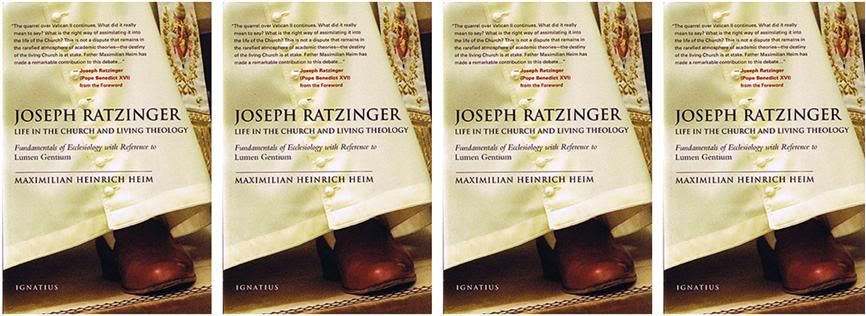 Apropos, Ignatius Insight today featured the ff excerpt from Fr. Maximilian Heim's book on Joswph Ratzinger's ecclesiology.
Apropos, Ignatius Insight today featured the ff excerpt from Fr. Maximilian Heim's book on Joswph Ratzinger's ecclesiology.


Oct. 16, 2009
We cannot return to the past, nor have we any desire to do so. But we must be ready to reflect anew on that which, in the lapse of time, has remained the one constant. To seek it without distraction and to dare to accept, with joyful heart and without diminution, the foolishness of truth — this, I think, is the task for today and for tomorrow. [1]
- Joseph Ratzinger
Joseph Ratzinger is considered by some to be the representative of a "petrified theology", [2] whereas for others [3] he is a voice that claims to speak the truth and makes it possible to perceive "the whole in its depth dimension" [4]
This dissertation places him — amid the tensions of present-day disputes within the Church about the patrimony of the Second Vatican Council—as an ecclesiologist at the center of this discourse, by setting forth his statements about the Church as a central aspect of an existential theology.
Because theology and ecclesial life have been melded into one in an unusual way in Ratzinger's work, his theological thought can be characterized as "existential", without thereby relegating it to the realm of the merely subjective.
Ratzinger is in fact concerned about a theology that proceeds, not from a private being, but rather from an existence that has surrendered itself to the Church, [5] in other words, "a theology of ex-sistere, of that exodus by which the human individual goes out from himself and through which alone he can find himself", [6] a theology, therefore, that seeks God in the Church and through the Church as its preexisting center. Consequently, its task consists of "keeping what is earthly and human so that it is trans- parent toward the truly fundamental reality, the divine reality that opens itself to us through Christ in the Holy Spirit". [7]
If we understand theology this way, it becomes clear that Ratzinger's thought, in keeping with the patristic tradition, is defined, not by an opposition [8] between salvation history and its ontological unfolding, [9] but rather by a mutual ordering of the two that constantly adheres to the "prae [logical and temporal priority] of God's action". [10] This means that "faith in an actio Dei is antecedent to all other declarations of faith", because for God, it is precisely relationship and action that are the essential marks; creation and revelation are the two basic statements about him, and when revelation is fulfilled in the Resurrection, it is thus confirmed once again that he is not just one who is timeless but also one who is above time, whose existence is known to us only through his action. [11]
Defending this "primacy of God" [12] brings about a development in Ratzinger's theology — as Dorothee Kaes explains — from a theology that originally had a more pronounced orientation toward salvation history [13] to thinking that is more characteristically metaphysical, [14] and this development occurs as a response to the intellectual debates of a given time period. [15]
Since my dissertation on Ratzinger's ecclesiology is situated within the context of the postconciiar developments in the Church, I was confronted with the question about an adequate reception of that image of the Church that the Second Vatican Council had outlined.
In this regard, Ratzinger is not only a contemporary witness, but also a theologian who, as Thomas Weiler [16] has attempted to demonstrate, was himself able to exert influence on the Council's ecciesiology.
Although it is not my purpose simply to reverse Weiler's approach and to maintain that the Council influenced Ratzinger the theologian, it is still undeniable that there was a reciprocal effect [17] and that consequently Ratzinger must be understood not only as an expert in the conciiar ecclesiology, as one of those who helped to shape it, but at the same time also as one of its most resolute defenders and as someone who continues to interpret and apply it concretely in his writings.
Thus two sets of questions result for the development of my theme: first, an inquiry into the Church's understanding of herself in Lumen gentium and, secondly, an investigation of Ratzinger's ecclesial life and the main lines of his ecciesiology; which has been shaped by his career.
The first part of the dissertation, about Lumen gentium, will set out to provide the conceptual frame of reference for the discussion of Ratzinger's ecclesiological outline in the second part, whereby the fundamental themes of mystery, the People of God, and collegiality, which are structural elements of Lumen gentium, serve as the main coordinates for the systematic development of the subject.
I have chosen them as guidelines for presenting Ratzinger's theology as well, because he himself associates them with the authority of the Second Vatican Council's Constitution on the Church. [18]
In any case the second part does not intend to make a detailed comparison with Lumen gentium; rather, it intends to show the importance of the main ecciesiological themes of the Constitution on the Church in Ratzinger's work, to note points of agreement or differences and modifications, and, where appropriate, to point out changes in Ratzinger's approach.
In this regard, the question of how and when Ratzinger articulated the ambiguities [19] in Lumen gentium will serve as a litmus test for whether or not there was a change in his perspective. For this reason it is necessary to pay special attention to the historical factor in our discussions.
This is accomplished, on the one hand, by tracing the principal stages of development both for Lumen gentium and for Ratzinger and, on the other hand, by explicitly examining the historical context at pivotal points of the systematic treatment of the subject. In this I am guided by the following suggestion of Weiler:
A thorough study of Ratzinger's postconciliar ecclesiological writings would of course have to investigate which of Ratzinger's ideas remained unchanged and where, if at all, a change can be noted. Why did that happen? And with regard to the ideas that remained the same, one should ask whether they, in being brought into a new historical and theological context, do not acquire a different significance. Finally:
Does the fact that Ratzinger's ideas remained the same really correspond thoroughly to the Second Vatican Council, which was, after all, in Ratzinger's view as well, "only the formulation of a task", which is to say, the beginning of a fundamental change, the accomplishment of which was (and is) still in the future? [20]
Before I outline the structure and division of my investigation, I should clarify why I take up Lumen gentium and not Gaudium et spes as the frame of reference for my discussion of Ratzinger's ecclesiology, even though the latter, in my opinion, would also be quite possible and reasonable. [21]
The answer is twofold: First, in keeping with Ratzinger's approach, I attempt to shed light on the Church's intrinsic nature. For this purpose Lumen gentium is a suitable reference. Moreover, according to Wolfgang Beinert, the "other fifteen constitutions, decrees, and declarations lead to this Council document or are derived from it". [22]
The second reason for my decision is related to the first. It can be expressed precisely by means of a programmatic statement by Ratzinger of his position in the year 1975:
An interpretation of the Council that 0understands its dogmatic texts as mere preludes to a still unattained conciliar spirit, that regards the whole as just a preparation for Gaudium et spes and that looks upon the latter text as just the beginning of an unswerving course toward an ever greater union with what is called progress — such an interpretation is not only contrary to what the Council Fathers intended and meant, it has been reduced ad absurdum by the course of events.
Where the spirit of the Council is turned against the word of the Council and is vaguely regarded as a distillation from the development that evolved from the "Pastoral Constitution", this spirit becomes a specter and leads to meaninglessness. [23]
Ratzinger traces the cause of this subsequent influence of Gaudium et spes, which he regards as problematic, back to the spirit of the preface. [24]
In his opinion, the text of the Pastoral Constitution serves as "a kind of countersyllabus" for many theologians, who imagine that it "represents, on the part of the Church, an attempt at an official reconciliation with the new era inaugurated in 1789". [25] But since "the world, in its modern form" cannot be regarded as a homogeneous entity, the Church's progress cannot consist of "a belated embrace of the modern world". [26]
From this insight Ratzinger derives the following basic rule, ten years after the end of the Council: "We must interpret Vatican Council II as a whole and ... our interpretation must be oriented toward the central theological texts." [27]
The two reasons just outlined, Ratzinger's preference for an essential ecciesiology and his partiality for the dogmatic documents of the Council, led me to select Lumen gentium as the background against which to present his ecclesiology.
This means simultaneously, however, that the "outward-looking" perspectives are considered only in passing in this dissertation. This is true, specifically, with regard to Ratzinger's statements on the complicated question of the relation between the Church and the world [28] and his writings concerning ecumenism [29] as well as inter-religious dialogue [30] and, last but not least, concerning the relation between the Church and Judaism. [31] [Precisel the areas considered most problematic by the Lefebvrians!]
My subject is further limited by the fact that I concentrate above all on the initiatives Ratzinger has taken as a scholar, and not on the contributions he has made to theological discussion in his official, magisterial capacity, even though it was impossible to avoid some overlapping on certain questions.
After these preliminary remarks concerning methodology, I would like to define now more precisely the principal points of this dissertation and to explain its structure.
Part I, on the Church's self-understanding according to Lumen gentium, comprises two sections, one historical and one systematic. The latter is subdivided, following the sequence of the first three chapters of Lumen gentium, under the headings of "The Mystery of the Church", "The People of God", and "The Hierarchical Structure of the Church and in Particular the Episcopate".
Because of their intrinsic relatedness, the themes of chapters 4 through 8 of Lumen gentium on the laity (4), on the universal call to holiness in the Church (5) on consecrated religious (6), on the eschatological character of the pilgrim Church and her union with the Church in heaven (7), and finally on the Blessed Virgin Mary; the Mother of God, in the mystery of Christ and of the Church (8) are considered in the chapter on the People of God.
In chapter I, on the mystery of the Church, an essential point is the aspect of communio; here the trinitarian communio is presented as the origin and purpose of Church unity. In chapter 2, in keeping with the Dogmatic Constitution, I will elaborate on the participation of the People of God in the priestly, prophetic, and kingly mission of Christ — an aspect that plays a relatively insignificant role in Ratzinger's ecclesiology In chapter 3, the college of bishops takes center stage in my discussion.
There I will examine above all the sacramental understanding of the episcopal ministry and inquire about how the "Preliminary Note of Explanation" added, to Lumen gentium should be evaluated, both historically and with regard to its contents — a problem that was of decisive importance especially for Ratzinger as one of the theologians at the Council.
Part 2 of this book deals with Ratzinger's ecclesiology. It is structured along the lines of Lumen gentium and treats in succession the principal themes of the Dogmatic Constitution on the Church. In it I intend to show which fundamental ideas Ratzinger adopts in his ecciesiology, which themes he prefers, and which ones he modifies in his presentation or does not take into account at all.
As in the first part of this dissertation, the systematic section is preceded by a historical section I, which discusses the "Outline of the Ecclesiological Plan from a Biographical Perspective". In this "prelude", the question of the consistency in Ratzinger's theological thought is especially explosive.
Section 2 deals at first, in chapter I, with the Church as sign of faith and mystery of faith. Three central concepts of Ratzinger's ecciesiology are examined therein, namely, Body of Christ, Eucharist, and communio. The chapter concludes with critical reflections on the question of the subsistence of the Catholic Church.
Chapter 2 is devoted to the Church as the People of God In it I will point out Ratzinger's references to rabbinical theology so as to demonstrate by means of concrete examples the ecciesiological consequences of the scriptural unity of the Old and New Testaments that he insists upon. In particular, this line of Ratzinger's reasoning is important also for the controversial question of the ontological priority of the universal Church.
The chapter goes on to deal with his oft-repeated claim that the term "People of God" has been misunderstood in a sociological sense, and the problem of democratic structures in the Church is discussed along with the themes of "relativism" and "majority rule". Comments on the section "The Universal Call to Holiness" conclude the chapter.
In this context the importance of the mariological declaration for Ratzinger's ecclesiology is stressed, but also the problem of the Church's sinfulness, with reference to the verse from the Song of Solomon "I am black but beautiful", [32] which has been applied to the Church, and with the assistance of the image of the casta meretrix (chaste prostitute) .
The conclusion of the main part of my work is chapter 3, on Ratzinger's understanding of the hierarchical constitution of the Church and, especially, of episcopal collegiality.
By way of introduction, the latter is set forth as an ecumenical paradigm, and then it is examined with regard to its origin, to the inherent tension between collegiality and primacy, and to its pastoral implications.
The last part of this chapter is devoted to those emphases in Ratzinger's thought that have changed so much over the course of time that one can speak of an early and a later Ratzinger.
Specifically, from his judgments on the value of bishops' conferences and of the synod of bishops, it will become evident how the later Ratzinger assigns a different theological weight to collegial formations than the earlier Ratzinger did.
Part 3 presents a "synoptic" overview. In summarizing, it compares the ecclesiology of Lumen gentium with that of Ratzinger. My concluding essay on the problematic position of modernity in intellectual history, which is behind Ratzinger's ecclesiology, attempts to sketch an outline of his thought against this backdrop and to pave the way toward a more nuanced answer to the question of its continuity or discontinuity.
Finally, in a concluding remark, the liturgy is depicted as the hermeneutic locus of theological ecclesiology, in keeping with the axiom lex orandi-lex credendi, so as the emphasize and reflect critically on what is distinctive about Ratzinger's markedly eucharistic theology of communio.
ENDNOTES:
[1] J. Ratzinger, "Der Weltdienst der Kirche: Aurwirkungen von Gaudium et spes im letzten Jahrzehnt", IKaZ 4 (1975):439-54. Reprinted in Principles, 373-93, as the epilogue, "Church and World: An Inquiry into the Reception of Vatican Council II". Citation at 393.
[2] Häring, Ideologie, 21.
[3] We should mention here, for example, Stephan Otto Horn and Vinzenz Pfnür as representatives of Ratzinger's "circle of students". The names of the members of this Schülerkreis ad of those who presented papers at their gatherings were published in Mitte, 316f.
[4] See Stephan Otto Horn and Vinzenz Pfnür, "Introduction", in Pilgrim Fellowship, 9-16, citation at 12.
[5] See the foreword of W. Baier et al., eds., Weisheit Gottes—Weisheit der Welt: Festschrift für Joseph Kardinal Ratzinger zum 60. Geburtstag (Sankt Ottilien: EOS-Verlag, 1987), I:v.
[6] Principles, 171-90, citation at 189.
[7] Horn and Pfnür, "Introduction", 9-14, citation at 10.
[8] In this way, Ratzinger decisively distances himself from Bultmann's thesis that "the word, the kerygma, is the real salvation-event, the 'eschatological event', that leads man from the alienation of his existence to its essence. This word is present wherever it makes itself heard; it is the always-present possibility of salvation for mankind. It is clear that, in the last analysis, this primacy of the word that, as such, can always be spoken and thus can be posited as always present, cancels the notion of a continuous series of salvation-historical events" (Principles, 176), in that it separates a theologically insignificant history from a theologically relevant "story". The latter remains, in Bultmann's scheme, a "word-event" unconnected with the historical events. Compare Kaes, 89f. Ratzinger sees in this opposition between salvation history and metaphysics a problem that did not come so acutely to the fore until after the Second Vatican Council. The reason for this may be explained by the fact that "Vatican Council II did not link its debate on salvation to the already existing patristic term dispositio (or dispensatio) but rather coined for itself, as a borrowing from the German, the expression historia salutis. Therewith we have also an indication of the source of the problem that, in our century, has entered Catholic theology by way of Protestant thought" (Principles, 572).
[9] See ibid.
[10] Ibid., 185.
[11] Ibid.
[12] Pilgrim Fellowship, 284-98, citation at 287.
[13] Along with G. Söhngen, Ratzinger stresses "emphatically that the truth of Christianity is not the truth of a universally accepted idea but the truth of a unique fact" (Principles, 174). Cf. G. Söhngen, Die Einheit in der Theologie (Munich: Zink, 1952), 347.
[14] For particulars, see Kaes, 86-88.
[15] Pt. 3, sec. 2, of this book, "Ratzinger's Ecciesiology against the Background of Issues in Intellectual History".
[16] Cf. Weiler, 151-283, esp. 281-83.
[17] See J. Ratzinger, "Geleitwort" [preface], in Weiler, xiii; similarly: G. Alberigo, "Die konziliare Erfahrung: Selbständig lernen", in Wittstadt, 2:679-98, esp. 688f.
[18] See Church 3-20; "Ecciesiology", 123-52.
[19] Cf. Pt. 2, sec. 2, chap. 3, § 4, "Aspects during the Council in Tension with the Later Perspective", and pt. 3, sec. I, "Comparison between the Main Lines of Lumen gentium and of Ratzinger's Ecclesiology".
[20] Weiler 315. In the same passage, Weiler cites J. Ratzinger, Die letzte Sitzungsperiode des Konzils (Cologne: Bachem, 1966), 73; cf. Highlights, 183. In 1996, Weiler declared (11f.) that, even though the theme of "Church" is an important focal point in Ratzinger's work as a whole, "it is astounding that so far relatively few publications have been dedicated to this important aspect .... A monograph on Ratzinger's ecclesiology has not yet appeared." Weiler did not consider the unpublished dissertation of K.-J. E. Jeon, Die Kirche bei Joseph Ratzinger: Unter- suchungen zum strukturierten Volk Gottes nach der Kirchenlehre Joseph Ratzingers (unpublished dissertation, Innsbruck, 1995). An extensive list of further publications on Ratzinger's theology can be found in Weiler, 11f. Worth noting also is the bibliography of secondary literature compiled by Helmut Moll under the title "Rezeption und Auseinandersetzung mit dem theologischen Werk von Joseph Cardinal Ratzinger", in Mitte, 309-15.
[21] It seems to me that Ratzinger's stance with regard to Gaudium et spes deserves separate study, since Ratzinger has grappled with this document on several occasions. He declared in 1975, for example, that Gaudium et spes is "the most difficult and, [along] with the 'Constitution on the Sacred Liturgy' and the 'Decree on Ecumenism', also the most [consequential]" Council document, on account of the problem of finding a suitable concept of "the world" (Principles, 378).
[22] Beinert, "Kirchenbilder in der Kirchengeschichte", in Kirchenbilder, Kirchenvisionen: Variationen über eine Wirklichkeit, ed. Beinert, 58-127, citation at III (Regensburg: Pustet, 1995).
[23] Principles, 390.
[24] Cf. ibid., 379. For a more detailed discussion, see t. 2, sec. I, chap. 3, § 1, Of this book, "The Council: 'The Beginning of the Beginning'?"
[25] Principles, 381, 382.
[26] Ibid., 390.
[27] Ibid.
[28] "See, for example, "Weltoffene Kirche? Überlegungen zur Struktur des Zweiten Vati- kanischen Konzils", in Volk Gottes, 107-28. Cf. also "Der Christ und die Welt von heute: Überlegungen zur Pastoralkonstitution des Zweiten Vatikamschen Konzils", in Dogma, 183-204, along with the commentary on articles 11-22 of Gaudium et spes, in LThK.E, vol. 3 (Freiburg im Breisgau: Herder, 1968), 313-54.
29 example is the striking essay entitled "Prognosen für die Zukunft des Ökumenismus", in Mitte, 181-94. It also contains the so-called Ratzinger formula, which states that "Rome must not demand more from the East by way of doctrine on the primacy than was formulated and practiced during the first millennium." We will treat this subject more thoroughly in this book in pt. 2, sec. 2, chap. 3, § 4.2, entitled "Concrete Forms of Episcopal Collegiality, as Variously Interpreted".
[30] See, for example, Salt of the Earth, 243-55.
[31] See the first volume of the Urfelder series, which especially promotes dialogue between Jews and Christians: J. Ratzinger, Many Religions-One Covenant, trans. Graham Harrison (San Francisco: Ignatius Press, 1999).
[32] Song 1:5.
[Modificato da TERESA BENEDETTA 17/10/2009 10:01] |
| |
|
| |
 17/10/2009 01:10 17/10/2009 01:10 |
|
| | | OFFLINE | | Post: 18.651
Post: 1.299 | Registrato il: 28/08/2005
Registrato il: 20/01/2009 | Administratore | Utente Veteran | |
|
 STATE GUESTS AT THE VATICAN, 1O/16/09
Translated from
STATE GUESTS AT THE VATICAN, 1O/16/09
Translated from
 PRINCE ALBERT II OF MONACO
PRINCE ALBERT II OF MONACO
The Vatican communique on the audience says that "after having looked at some current international issues - like the integral development of peoples and the protection of natural resources and the environment - they dwelt on some topics of common itnerest, such as the importance of a solid cultural and moral formation of the young generations and the defense of life in all its stages."
As usual, the Prince met with Cardinal Secretary of State Tarcisio Bertone and his deputy for relations with other states, Mons. Dominique Mamberti, after his audience with the Pope.
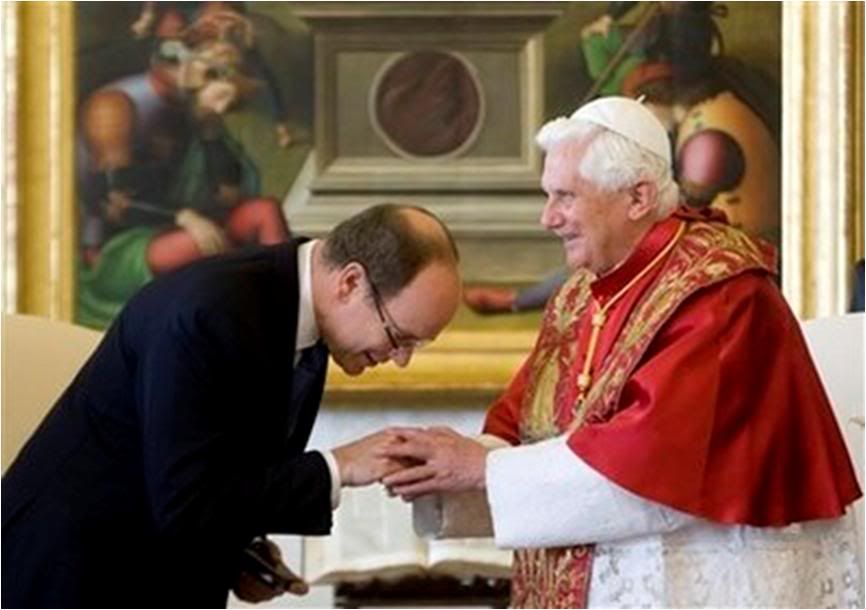
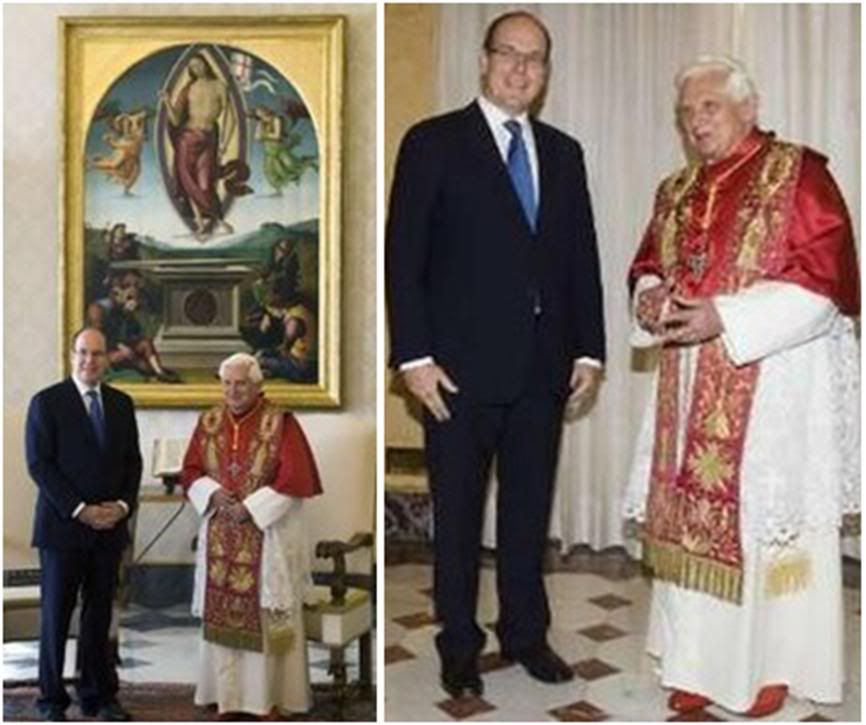
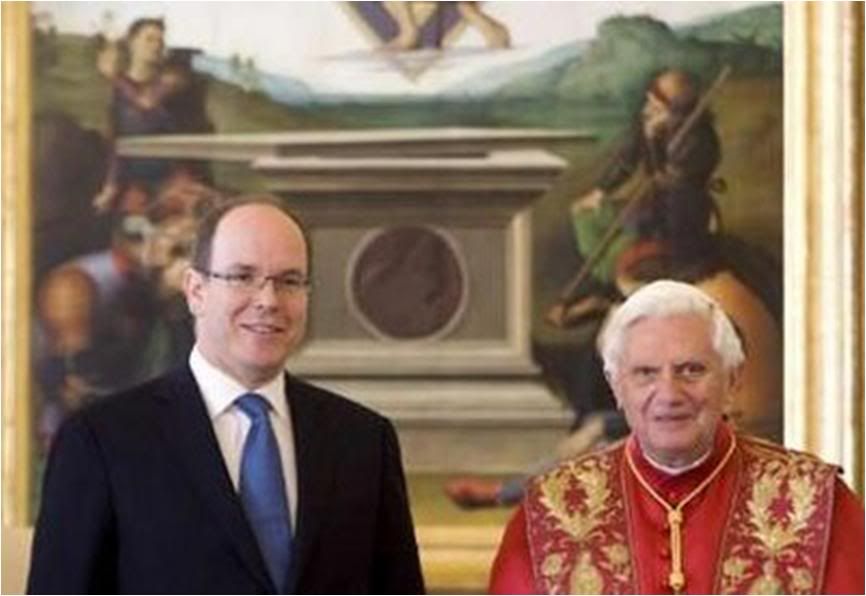
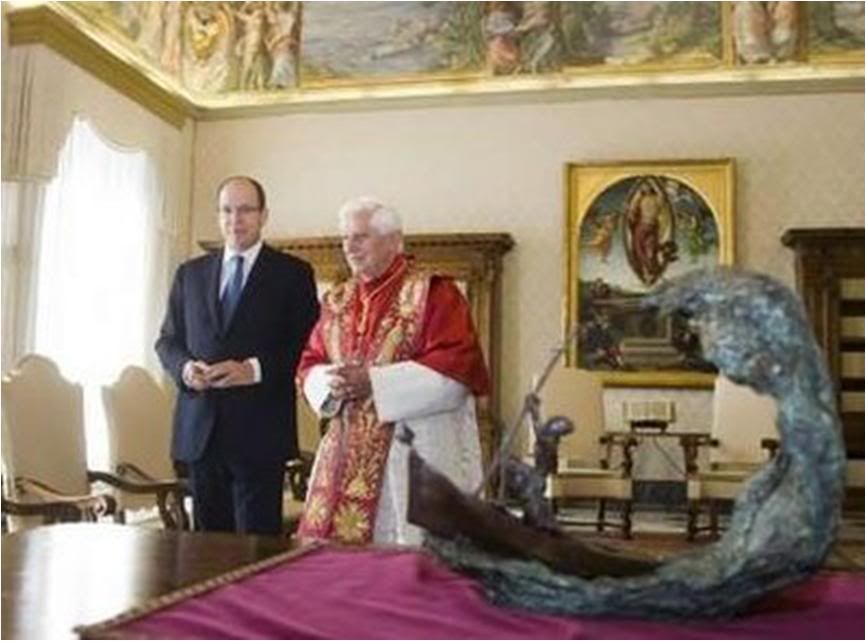
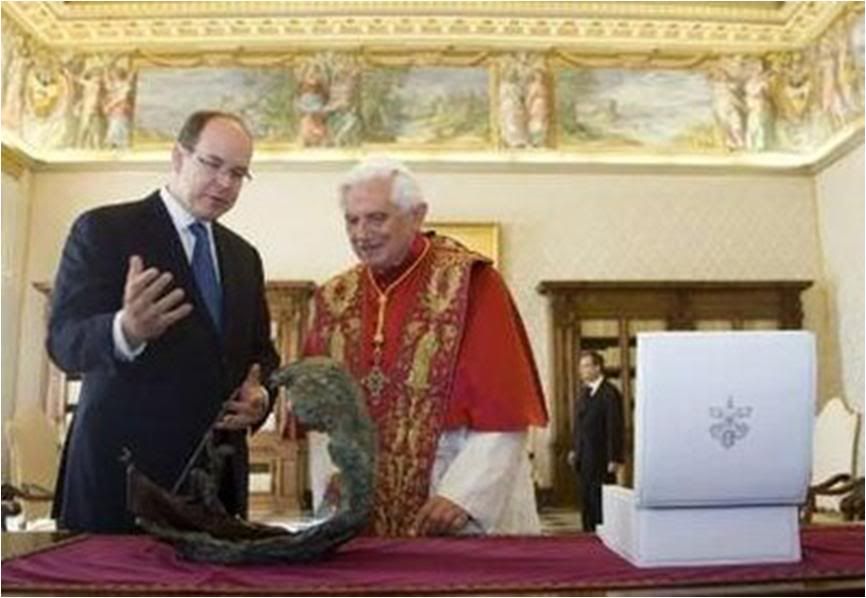 PRIME MINISTER YULIA TIMOSHENKO
PRIME MINISTER YULIA TIMOSHENKO
OF THE UKRAINE
With the Prime Minister, the Pope discussed topics related to promoting peace and international collaboration, especially in the European context.
They dwelt on the contributions of the Catholic Church of both rites (Latin and Greek) to Ukrainian society, especially in education adn the promotion of human and Christian values.
They reviewed the outstanding questions in relations between civilian and religious authorities in the Ukraine, with the hope that recent positive developments will help solve pending issues.
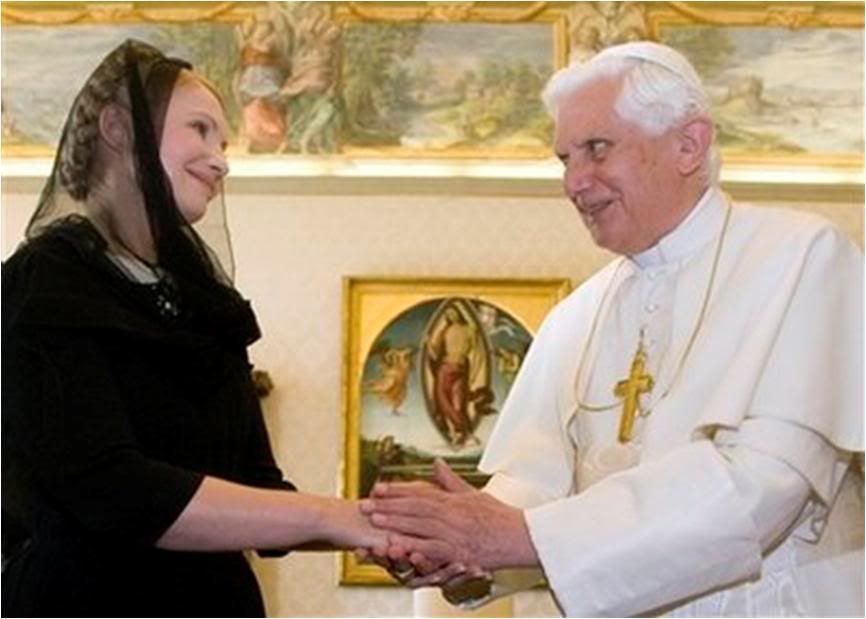
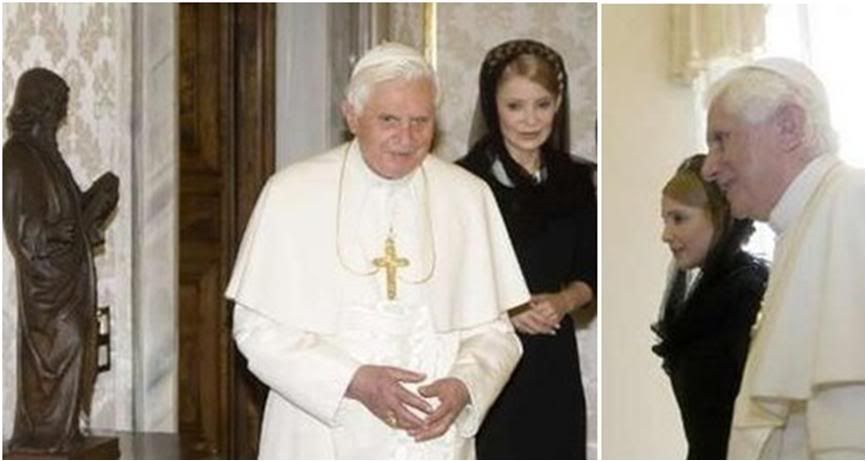
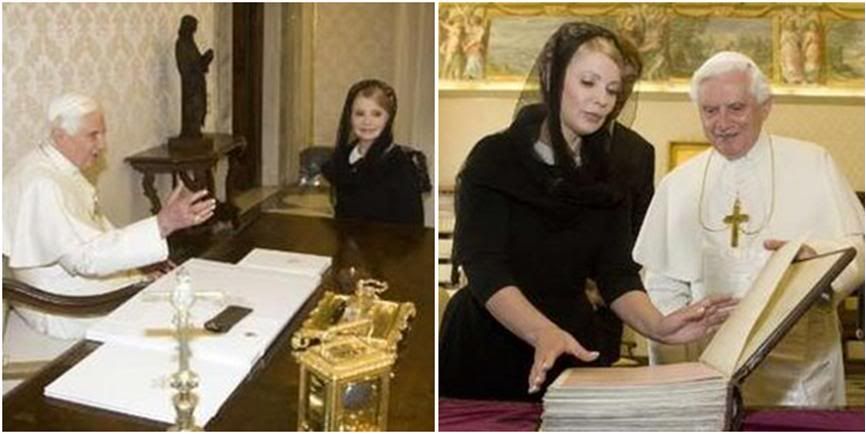
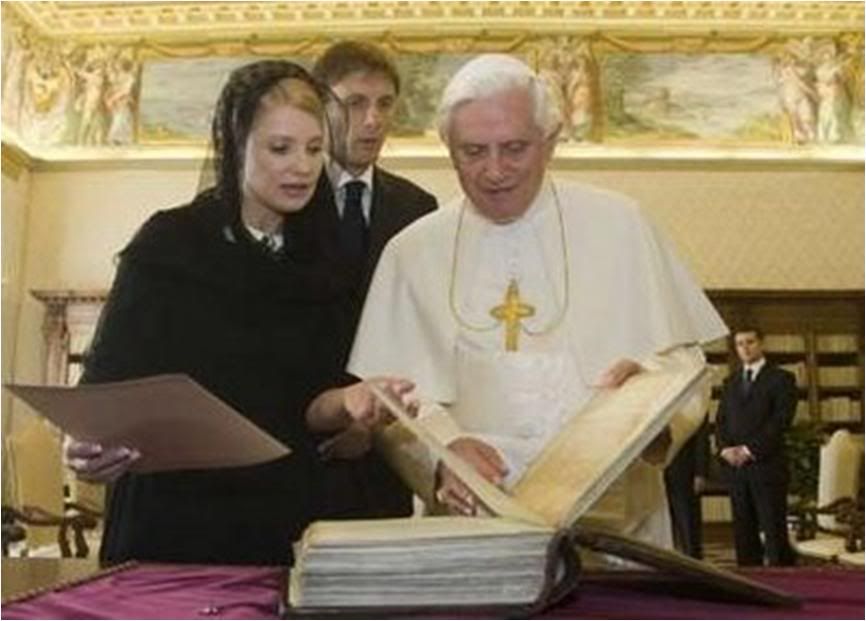 I wonder why the Holy Father did not wear choir dress and mozzetta for the meeting with Mme. Timoshenko. Since presumably she is not Catholic, he would not have worn the stole he had on for Prince Albert, but choir dress and mozzetta are supposed to be protocol for visitors of state.
I wonder why the Holy Father did not wear choir dress and mozzetta for the meeting with Mme. Timoshenko. Since presumably she is not Catholic, he would not have worn the stole he had on for Prince Albert, but choir dress and mozzetta are supposed to be protocol for visitors of state.
[Modificato da TERESA BENEDETTA 17/10/2009 10:33] |
| |
 17/10/2009 02:21 17/10/2009 02:21 |
|
| | | OFFLINE | | Post: 18.652
Post: 1.300 | Registrato il: 28/08/2005
Registrato il: 20/01/2009 | Administratore | Utente Veteran | |
|
 Benedict XVI's message
Benedict XVI's message
for World Food Day:
To achieve food security,
promote agricultural development
in the poorer countries
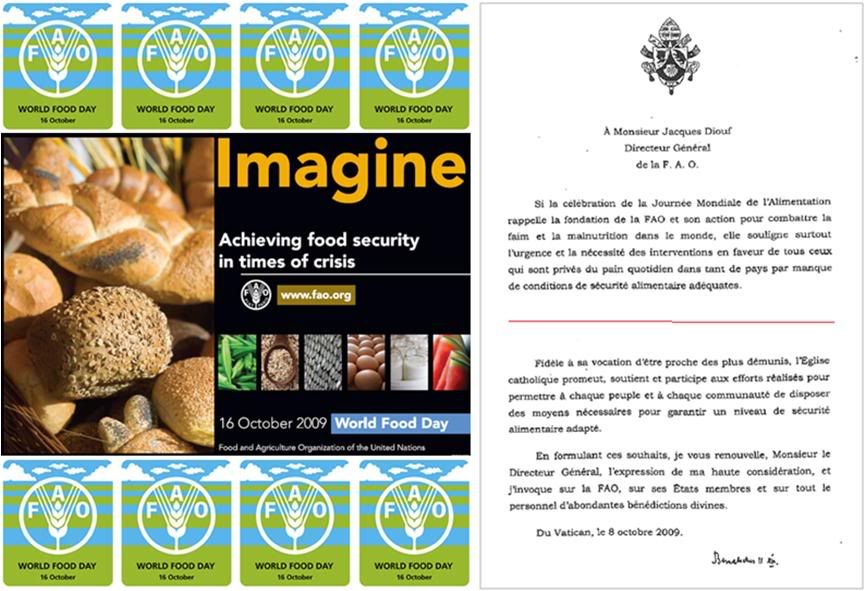
Here is the translation of the letter written by Pope Benedict XVI in French to the Director General of the UN's Food and Agricultural Organization on the occasion of World Food Day. The message was read by the Vatican representative at a program in FAO headquarters today.
To Mr. Jacques Diouf
Director General
Food and Agricultural Organization
As the celebration of World Food Day recalls the foundation of FAO and its activities to combat hunger and malnutrition, it underscores above all the urgency and need for interventions in behalf of all those who lack their daily bread in so many countries because of the lack of conditions for adequate food security.
The present crisis, which cuts without distinction across all sectors of the economy strikes in particularly serious manner at the world of agriculture, where the situation has become tragic. This crisis calls on governments and the various components of the international community to make decisive and effective choices.
To guarantee to persons and peoples the possibility of defeating the scourge of hunger means to assure them of concrete and adequate access to healthy food. It deamnds, in fact, a concrete manifestation of the right to life which, although solemnly proclaimed, too often remains far from fulfillment.
The theme chosen by the FAO for this year's World Food Day is "Achieving food security in times of crisis". It means considering agriculture as a fundamental element of food security, and therefore, an integral component of economic activity.
For this reason, agriculture should be able to dispose of a sufficient level of investments and resources. It is clear that the goods of creation are limited by nature: they thus require responsible attitudes that are capable of promoting food security, while thinking of future generations as well. Profound solidarity and a far-sighted brotherhood are therefore necessary.
The achievement of these objectives requires a necessary modification of lifestyles and ways of thinking. It obliges the international community and its institutions to intervene in a more adequate and more determined manner.
I hope that such intervention may favor a cooperation that protects the methods of cultivation proper to each area, and avoids the inconsiderate use of natural resources.
I also hope that such cooperation may safeguard those values pertaining to the rural world, as well as the fundamental rights of the workers of the land.
Setting aside privileges, profits and convenience, these objectives can be realized for the benefit of men, women, children, families and communities who live in the poorest areas of the planet, and are, therefore, more vulnerable.
Experience has shown that technical solutions, though advanced, lack effectiveness if they do not take account of the person - the principal protagonist who, in his spiritual and material dimension, is the origin and the end of every activity.
Access to food, more than being an elementary need, is a fundamental right of persons and peoples. It can become reality, and thus security, if adequate development in all the different regions is guaranteed.
In particular, the tragedy of hunger can only be defeated by "eliminating the structural causes that give rise to it and promoting the agricultural development of poorer countries...by investing in rural infrastructures, irrigation systems, transport, organization of markets, and in the development and dissemination of agricultural technology that can make the best use of the human, natural and socio-economic resources that are more readily available at the local level" (Caritas in veritate, No. 27).
The Catholic Church, faithful to its calling to be close to the least among people, promotes, supports and participates in efforts that will allow every people and community to dispose of the necessary measures that will guarantee an adequate level of food security.
With these wishes, I renew to you, Mr. Director-General, the expression of my high esteem, and invoke on the FAI, its member states and its personnel abundant celestial blessings.
From the Vatican
October 8, 2009


[Modificato da TERESA BENEDETTA 17/10/2009 03:01] |
| |
 17/10/2009 14:15 17/10/2009 14:15 |
|
| | | OFFLINE | | Post: 18.654
Post: 1.302 | Registrato il: 28/08/2005
Registrato il: 20/01/2009 | Administratore | Utente Veteran | |
|

 Saturday, Oct. 16
Saturday, Oct. 16
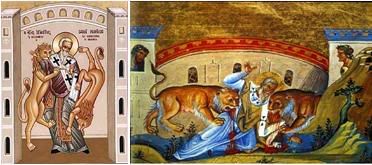 ST. IGNATIUS OF ANTIOCH (also Theophorus, 'God-bearer')
ST. IGNATIUS OF ANTIOCH (also Theophorus, 'God-bearer')
(born Syria ca. 28-35, died Rome ca. 108)
One of the Apostolic Patriarchs, Disciple of St. John
Third Bishop of Antioch, Martyr
He was fed to the lions under Emperor Trajan.
According to tradition, he was the child
Jesus took in his arms in Mark 9,35.
OR today.

The Pope's appeal on World Food Day:
More investment for agriculture in the poorer countries
There is an accompanying editorial commentary on 'Hunger and politics'. Also on Page 1: The Pope's audiences for Prince Albert of Monaco and Prime Minister Yulia Timoshenko of the Ukraine; a brief update on the Synodal assembly, where Friday was spent in sessions of the various working groups; and a story speculating that a runoff election in Afghanistan is looking more likely.
The inside pages contain the Catholic message to the Hindus of the world for Diwali; an item about the start of the first post-Ravenna sessions of the Mixed Catholic-Orthodox Commission for Theological Dialog, in Cyprus; Madrid prepares for Catholic rally tomorrow in defense of life; and three unusual articles regarding two cardinals of the Curia - Cardinal Raffaele Farina, Archivist and Librarian of the Holy Roman Church, who was given an honorary doctorate in theology and patristics by Rome's Istituto Patristico Augustinianum: his acceptance speech on the novelty of the Pax Constantiniana brought about by Emperor Constantine in the 4th century, and an article about his 1966 doctoral thesis on the work of the historian Eusebius as the first political theology of Christianity. The second cardinal is the Archpriest of St. Peter's Basilica, Cardinal Angelo Comastri, who has written a book on St. Peter, Ti chiamerai Pietro. Autobiografia del primo Papa ('I will call you Peter': Autobiography of the first Pope).
THE POPE'S DAY
No scheduled official events, but the Synodal Assembly bulletin says he attended the 16th general
congregation this morning, during which a draft of the assembly's final message was presented
and discussed.
This evening, a concert in honor of His Holiness at Aula Paolo VI by internationally-renowned
Chinese pianist Jin Ju, who will play on seven historic instruments illustrating the development
of the piano, with the music of Bach, Scarlatti, Mozart, Czerny, Beethoven, Chopin, Tschaikovsky
and Liszt. The occasion is the 20th anniversary of the Accademia Pianistica Internazionale
of Imola, in Italy's Romagna region, where Jin Ju teaches.
The Vatican announced that the Holy Father has named Cardinal Antonio Canizares Llovera,
Prefect of the Congregation for Divine Worship; and Mons. Raymond Burke, Emeritus Archbishop
of St. Louis and Prefect of the Supreme Tribunal of the Apostolic Segnatura - as members of
the Congregation for Bishops.
31 YEARS AGO TODAY...
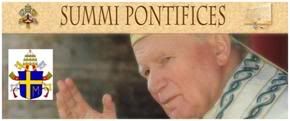
Cardinal Karol Wojtyla, Archbishop of Cracow,
was elected Pope, taking the name John Paul II.
He was remembered today at the Synod assembly,
along with St. Ignatius of Antioch.
Here's a video of that 'Habemus Papam':
www.youtube.com/watch?v=uPtKVeJKoYM
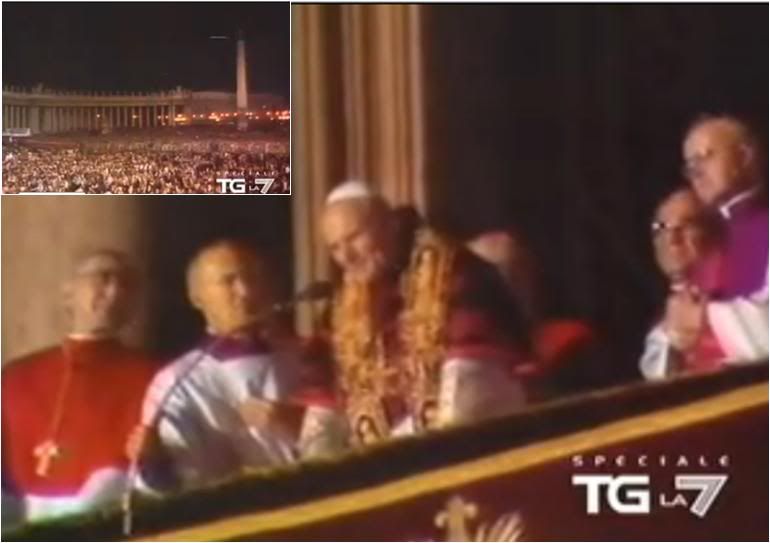
[Modificato da TERESA BENEDETTA 17/10/2009 22:59] |
| |
 17/10/2009 22:27 17/10/2009 22:27 |
|
| | | OFFLINE | | Post: 18.657
Post: 1.305 | Registrato il: 28/08/2005
Registrato il: 20/01/2009 | Administratore | Utente Veteran | |
|
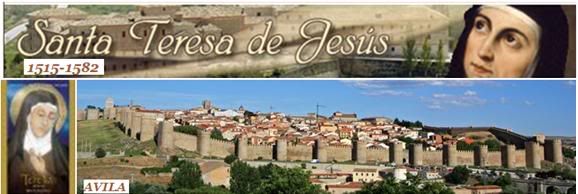 Bishop of Avila to request Pope
Bishop of Avila to request Pope
for 2015 Jubilee Year and visit
on fifth centenary of St. Teresa's birth

Madrid, Spain, Oct 16, 2009 (CNA) - Bishop Jesus Garcia Burillo of Avila, Spain, announced this week that he will be sending an invitation to Pope Benedict XVI to visit the diocese in 2015 to mark the 500th anniversary of the birth of St. Teresa.
The bishop added that he will also ask the Holy See to “declare a Jubilee Year” to celebrate the occasion.
Although he acknowledged that it may be difficult for the Pope to grant his request, Bishop Burillo said he would nonetheless extend a formal invitation to the Holy Father requesting “the inestimable grace of his presence among us.”
The bishop expressed his “deepest desire that His Holiness the Pope visit Avila for this centenary, as did his predecessor John Paul II in 1982 on the occasion of the closing of the 400th anniversary of the death of St. Teresa.”
Regarding the request for a Jubilee Year, Bishop Burillo said it would be a time “in which the Church would grant singular spiritual graces to the faithful to mark the anniversary of the birth of this Doctor of the Church.”
St. Teresa was proclaimed the first female Doctor of the Church by Pope Paul VI on September 27, 1970.
The bishop also invited the faithful of his diocese to enthusiastically join with the Carmelite Order, founded by the saint in 1562, in preparing for the celebrations.
It's very strange, but as early as 1617, the Spanish Parliament named Teresa of Avila Patroness of Spain, though she was not canonized till 1622 - but for some reason, the Church of Spain apparently never formally named her Patroness of Spain! In Sandro Magister's list of European patron saints [see post in CHURCH&VATICAN thread], only the Immaculate Conception and St. James are listed. So I reviewed the four Teresian addresses John Paul II gave during his remarkable 10-day visit to Spain in 1982 (he visited both Avila where she was born, and Alba de Tormes, where she died), and true enough, he does not once refer to her as a Patroness of Spain;
|
| |
 18/10/2009 04:13 18/10/2009 04:13 |
|
| | | OFFLINE | | Post: 18.658
Post: 1.306 | Registrato il: 28/08/2005
Registrato il: 20/01/2009 | Administratore | Utente Veteran | |
|
 PIANO RECITAL
PIANO RECITAL
FOR THE HOLY FATHER

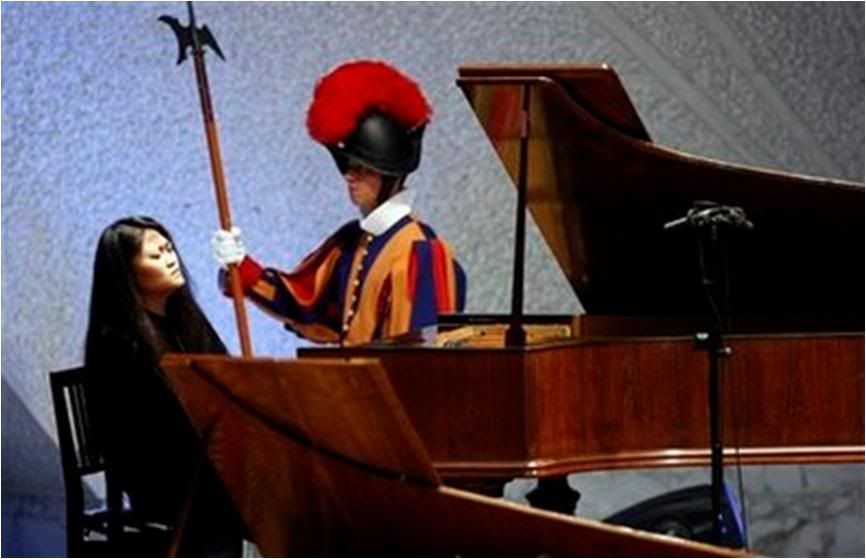
World-famous Chinese pianist Jin Ju, 31, gave a solo recital for the Holy Father Saturday evening at Aula Paolo VI, performing on seven historical instruments illustrating the development of the piano from the clavichord to the present concert grand piano.
She performed virtuoso pieces by Bach, Scarlatti, Mozart, Czerny, Beethoven, Chopin, Tschaikovsky and Liszt. The occasion was the 20th anniversary of the Accademia Pianistica Internazionale of Imola, in Italy's Romagna region, where Jin Ju teaches. It is considered Italy's leading piano school today.
I missed the first 25 minutes of the recital (missed the Bach, Scarlatti and Mozart, and came in while she was doing the Czerny), but managed to capture some images for the rest of it (almost an hour more) while listening enthralled to this amazing virtuoso pianist....
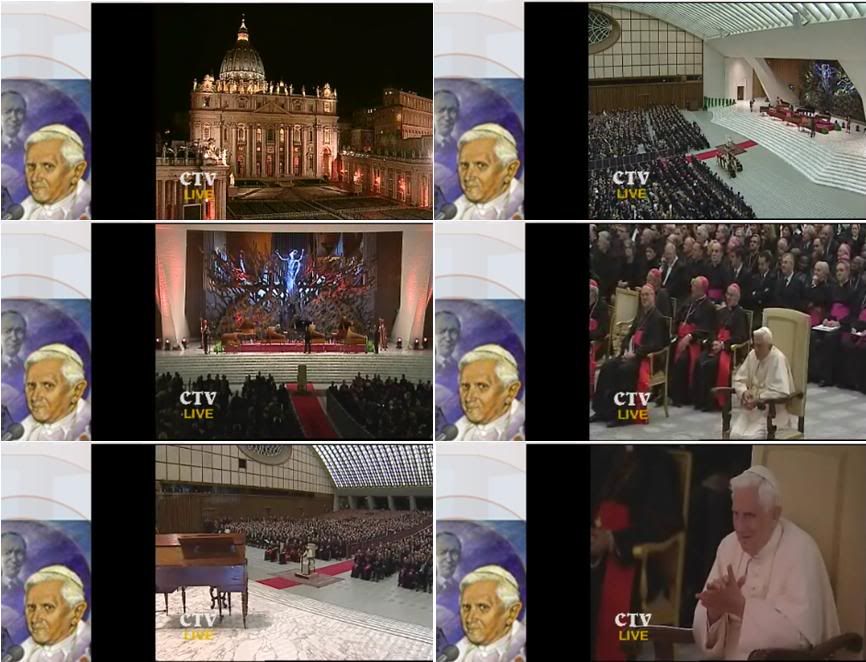 I indulged myself by cropping the screen captures in this first panel to include Papino 'peeking' from the Vatican Radio mural, as it appears on my PC screen - I still cannot get CTV directly through CTV but I discovered I can get it though Vatican Radio online!
I indulged myself by cropping the screen captures in this first panel to include Papino 'peeking' from the Vatican Radio mural, as it appears on my PC screen - I still cannot get CTV directly through CTV but I discovered I can get it though Vatican Radio online!
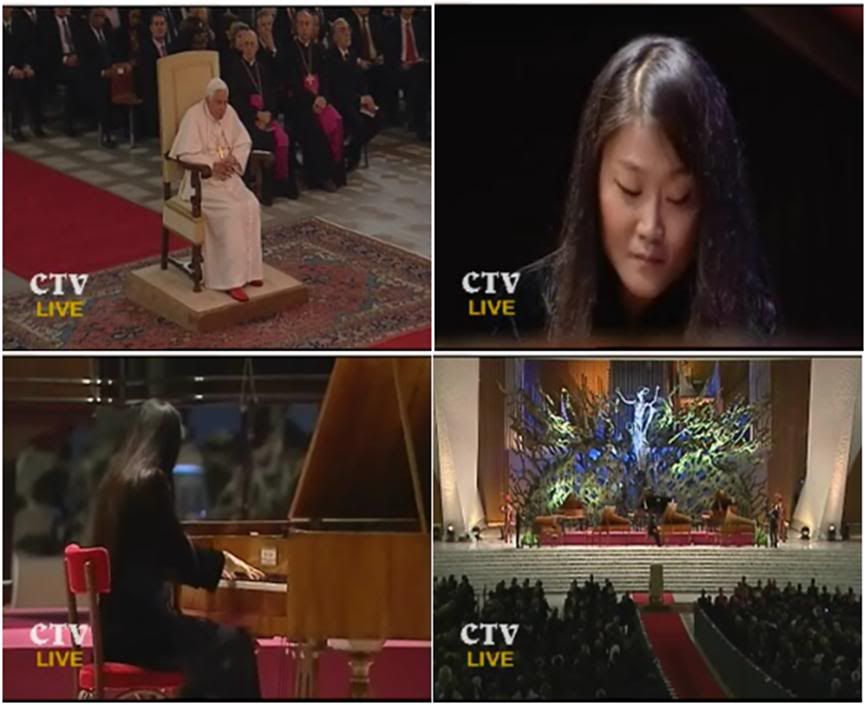
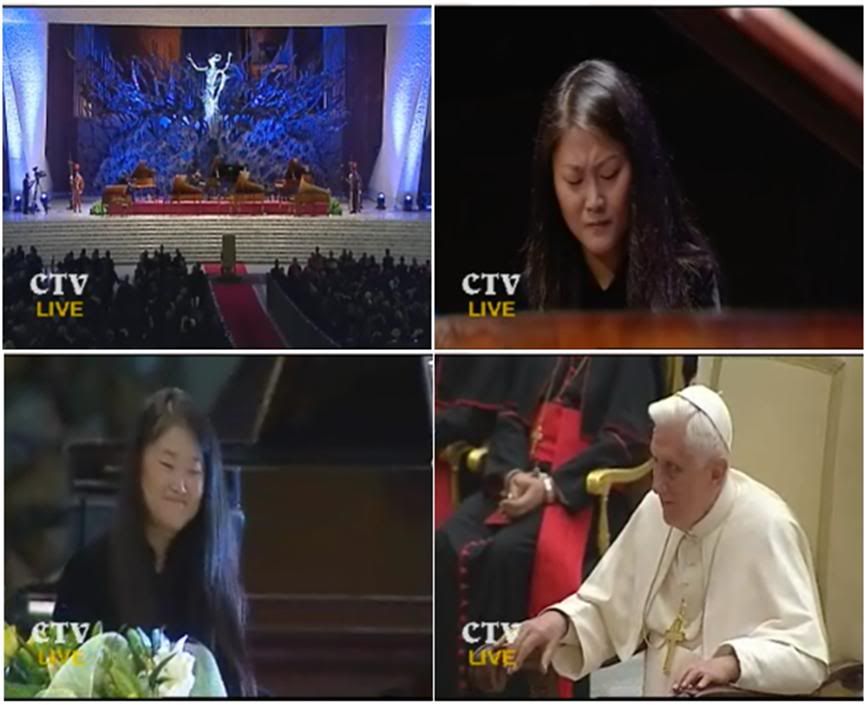 Here is a translation of the Holy Father's remarks after the performance:
Here is a translation of the Holy Father's remarks after the performance:
Eminent cardinals,
Dear brothers in the Episcopate and Priesthood,
Distinguished authorities,
Dear friends!
We gathered this evening for another concert of remarkable artistic level and great historical value after the concert we attended last week at the Auditorium of Via della Conciliazione.
I address to each and everyone my heartfelt greeting: to the cardinals, bishops and prelates, to the authorities, to the special guests and to all who are present. I wish to direct a partitcular greeting to the Synodal Fathers, who have wished to share together this moment of serene relaxation.
In the name of everyone, I express my heartfelt thanks to the "Encounters with the masters" program of the Accademia Pianistica Internazionale of Imola. I wish to thank and express sincere appreciation above all to Maestro Franco Scala, who founded this deserving musical institution twenty years ago and continues to lead it with passion and talent.
I also thank him for the words which earlier this evening he delivered on behalf of you all. And my gratitude to the pianist Jin Ju, who has made us experience the expressive potential of the keyboard, from the fortepiano to the pianoforte, and the emotional weight of the music she performed.
Finally, I must thank all those who in various ways cooperated to the realization of this event.
Dear friends, this evening we were led to an engaging itinerary, historic and artistic, which shows the evolution of the fortepiano, later pianoforte, one of the musical instruments best known and favored by the most famous music composers - an instrument that is capable of offering not a small range of harmonious musical nuances.
The seven (historical) instruments used tonight, coming from the important collection of Imola, which has more than a hundred of them, constitute in themselves an aesthetic, artistic and historic patrimony, both because they emit the sounds that men of the past heard, and because they bear witness to the progress in the craftsmanship of the pianoforte, revealing the intuitions and successive processes of its perfection by skilled and unequalled instrument builders.
This concert has allowed us, once more, to taste the beauty of music, a spiritual and therefore universal language, a vehicle that is more than ever adapted to understanding and unity among persons and peoples.
Music is part of all cultures and, we might say, accompanies every human experience, from pain to pleasure, from hate to love, from sorrow to joy, from death to life.
We see how in the course of centuries and millennia, music was always used to give shape to what cannot be expressed in words because it arouses emotions that are otherwise difficult to communicate. It is not by chance, therefore, that every civilization has given importance and value to music in its various forms and expressions.
Music - great music - opens up the spirit, inspires profound sentiments, and almost naturally invites us to lift up our minds and hearts to God in every situation, whether it is glorious or sad, of human existence. Music can become prayer.
Thanks again to those who organized this beautiful evening. Dear friends, I bless you all from my heart.
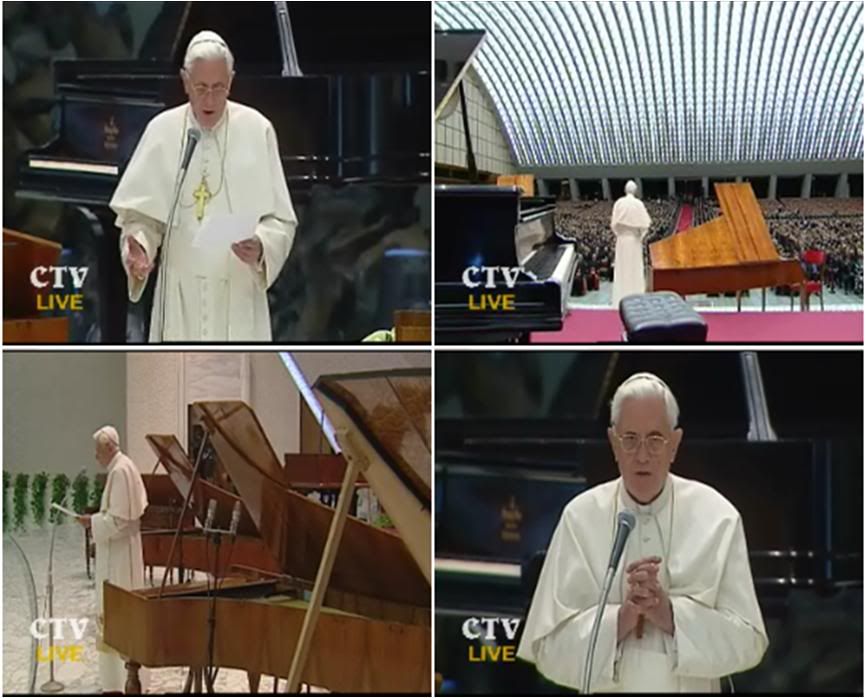 The longest piece Jin Ju played was Beethoven's Moonlight Sonata. I could not identify the Chopin and Tschaikovsky, but the latter was a real virtuosic feat. She ended with Liszt's Rigoletto Fantasy, and encored briefly with the 'Jesus joy of man desiring' excerpt from Bach's Cantata BWV 147.... Her playing is so clean that even in the most tempestuous and rapid virtuoso passages, one can hear each note articulated (rarely have I heard the left hand parts played so distinctly) that she sometimes sounded like there were more than two hands playing, and you could literally imagine the notes as they appear on the music score. She has such absolute mastery of technique that she can simply concentrate on her interpretation. In this, she is helped by her punctilious and awesome observance of dynamic markings (like Herbert von Karajan used to manage even with the largest orchestras).... One can only have reverence for the the composers who had the genius to produce endlessly inventive, technically challenging and spiritually uplifting music, and the performers who can execute them with such almost superhuman skill and exquisite artistry.... And one can appreciate all over what an exceptional and unequalled instrument the piano is (in all its versions). Is there a more demanding human skill? What a magnificent gift this recital was - and not only to the Holy Father! One comes away exalted!
The longest piece Jin Ju played was Beethoven's Moonlight Sonata. I could not identify the Chopin and Tschaikovsky, but the latter was a real virtuosic feat. She ended with Liszt's Rigoletto Fantasy, and encored briefly with the 'Jesus joy of man desiring' excerpt from Bach's Cantata BWV 147.... Her playing is so clean that even in the most tempestuous and rapid virtuoso passages, one can hear each note articulated (rarely have I heard the left hand parts played so distinctly) that she sometimes sounded like there were more than two hands playing, and you could literally imagine the notes as they appear on the music score. She has such absolute mastery of technique that she can simply concentrate on her interpretation. In this, she is helped by her punctilious and awesome observance of dynamic markings (like Herbert von Karajan used to manage even with the largest orchestras).... One can only have reverence for the the composers who had the genius to produce endlessly inventive, technically challenging and spiritually uplifting music, and the performers who can execute them with such almost superhuman skill and exquisite artistry.... And one can appreciate all over what an exceptional and unequalled instrument the piano is (in all its versions). Is there a more demanding human skill? What a magnificent gift this recital was - and not only to the Holy Father! One comes away exalted!
[Modificato da TERESA BENEDETTA 01/10/2010 23:15] |
| |
 18/10/2009 16:03 18/10/2009 16:03 |
|
| | | OFFLINE | | Post: 18.660
Post: 1.308 | Registrato il: 28/08/2005
Registrato il: 20/01/2009 | Administratore | Utente Veteran | |
|

 Sunday, Oct. 18
Sunday, Oct. 18
 ST. LUKE (Greek, born in Antioch, Syria; died in Thebes, Greece at age 84)
ST. LUKE (Greek, born in Antioch, Syria; died in Thebes, Greece at age 84)
Apostle and Evangelist, Patron Saint of Physicians
Companion of St. Paul, author of the Gospel considered to be the most historical of the four Gospels, and the Acts of the Apostles, recounting the history of the early Church following the Resurrection. He is believed to have painted an icon of Mary now kept in the Patriarchate of Constantinople and model for icons like the Roman Salus Populus Romanum and the Virgin of Czestochowa. His remains have had quite an itinerary and have been kept in the Church of St. Justina in Padua since the 12th century where it was taken from Constantinople for safekeeping. In 2001, scientific testing established the remains in Padua corresponded to what is known about Luke, and a head that had been kept in Pargue was shown to fit the Padua remains perfectly. See
www.telegraph.co.uk/news/worldnews/europe/italy/1360095/DNA-test-pinpoints-St-Luke-the-apostles-remains-to-Pa...
OR today.
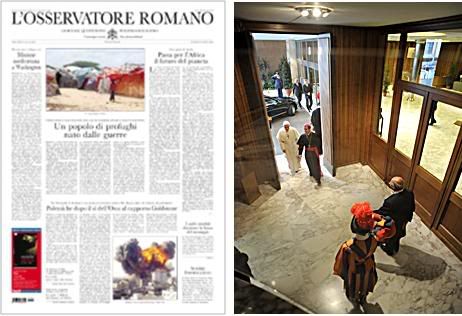
A front-page editorial sums up the first two weeks of the Synodal assembly on Africa
(photo shows the Pope arriving at yesterday's morning session). Inside there is an
essay on Benedict XVI's arguments for faith and reason 'from Regensburg to Bernardins'
from a lecture given at a recent Italian conference on monasticism in the East and West.
Page 1 international stories: More than 11 million live as refugees due to local conflicts
in Africa; more controversy after the UN Commission on Human Rights [most of its members
come from countries countries where human rights are regularly violated) approves
the so-called Goldstone report accusing both Israel and Hamas of 'crimes against
humanity' during the Gaza conflict in late 2008. Also inside: Two interesting essays on
Leonardo da Vinci and his famous 'Vitruvian man' drawing.
THE POPE'S DAY
Angelus - On the World Day for Missions today, the Pope pays homage to all missionaries
and prays especially for those in danger, citing recent incidents like the killing of
an Italian missionary in Brazil and the abduction of an Irish missionary in the Philippines.
[Modificato da TERESA BENEDETTA 18/10/2009 19:15] |
| |
 18/10/2009 16:34 18/10/2009 16:34 |
|
| | | OFFLINE | | Post: 18.661
Post: 1.309 | Registrato il: 28/08/2005
Registrato il: 20/01/2009 | Administratore | Utente Veteran | |
|
 ANGELUS TODAY
ANGELUS TODAY
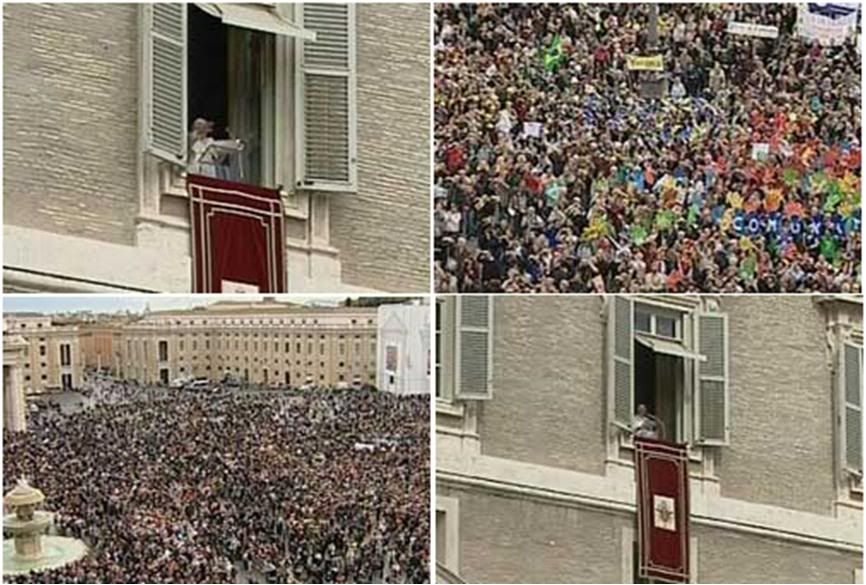
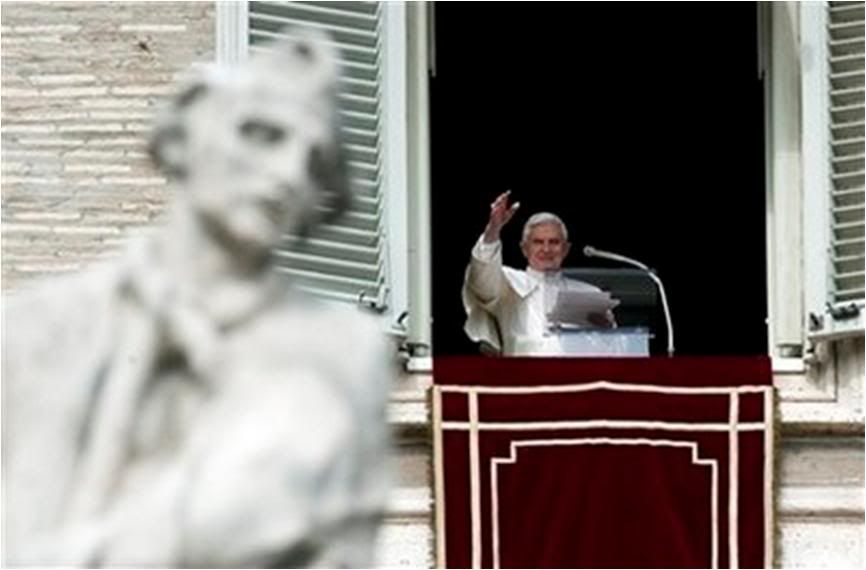
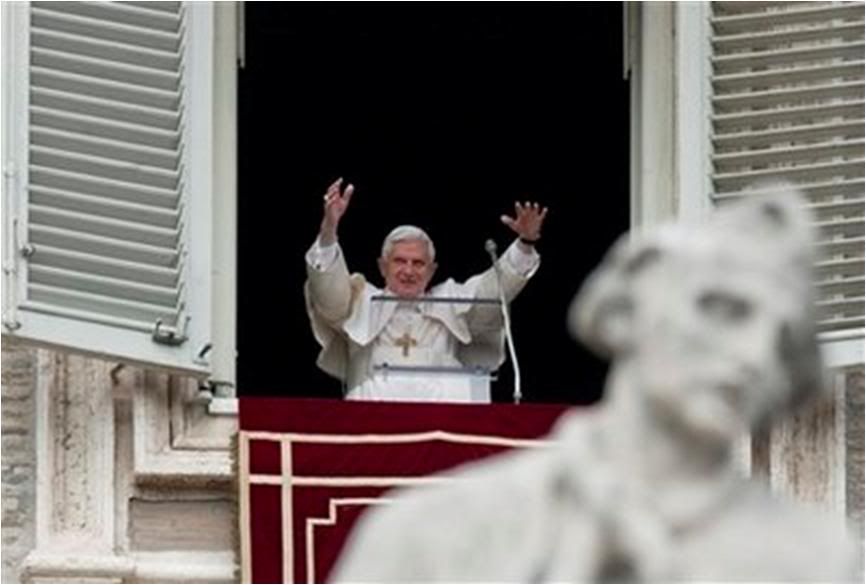
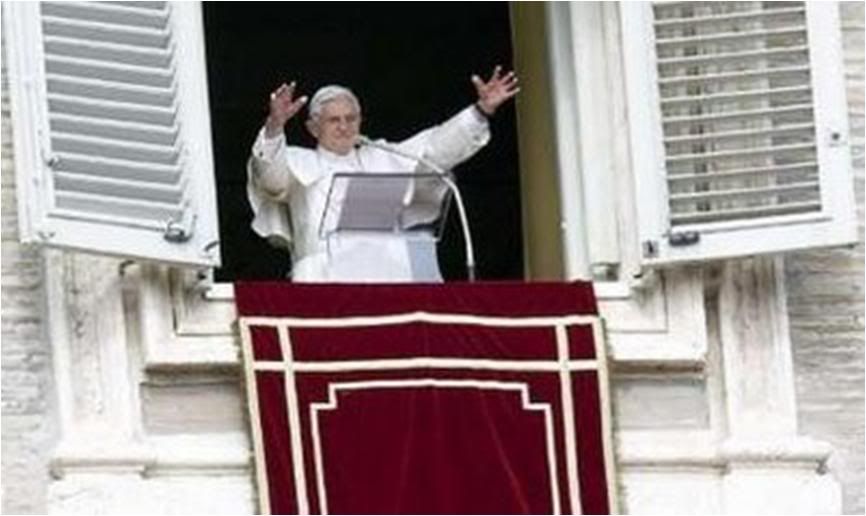 Here is a translation of the Holy Father's words at the Angelus today:
Here is a translation of the Holy Father's words at the Angelus today:
Dear brothers and sisters!
Today, the third Sunday in October, we celebrate the World Day for Missions, which constitutes for every ecclesial community and for every Christian a strong reminder of the commitment to announce and bear witness to the Gospel to everyone, particularly those who do not know it.
In the message that I wrote for this occasion, I was inspired by an expression in the Book of the Apocalypse, which in turn echoes a prophecy of Isaiah: "The nations will walk in his light" (Ap 21,24).
The light referred to here is that of God, revealed by the Messiah and reflected on the face of the Church, represented as the new Jerusalem, a wondrous city where the glory of God shines in its fullness.
It is the light of the Gospel, which orients the journey of the people of God and leads them towards the realization of a great family, of justice and peace, under the fatherhood of the the only good and merciful God.
The Church exists to announce this message of hope to all mankind, which in our time "has made stupendous conquests, but seems to have lost its sense of ultimate realities and of its own existence" (John Paul II, encyclical Redemptoris missio, 2).
In the month of October, especially on this Sunday, the universal Church highlights its own missionary vocation. Led by the Holy Spirit, she knows she is called on to continue the work of Jesus himself by announcing the Gospel of the Kingdom of God, which is "justice, peace and joy in the Holy Spirit" (Rom 14,17).
This Kingdom is already present in the world as the power of love, of freedom, of solidarity, of respect for the dignity of every man; and the ecclesial community feels in its heart the urgency of working so that the sovereignty of Christ may be fully realized.
All her members and articulations cooperate in this plan, according to their different stations in life and their charisms. On this World Day for Missions, I wish to recall the missionary men and women - priests, religious and lay volunteers - who consecrate their existence to bring the Gospel to the world, facing hardships and difficulties, and sometimes, even outright persecution.
I think, among others, of Fr, Ruggero Ruvoletto, a fidei donum priest who was recently killed in Brazil; of Fr. Michael Sinnot, a religious missionary, who was abducted a few days ago in the Philippines.
And how can we not think of what is emerging from the current Synodal assembly of bishops on Africa, in terms of extreme sacrifice and love for Christ and his Church?
I thank the Pontifical Missionary Works for the precious service that they render towards missionary inspiration and formation. And I invite all Christians to an act of material and spiritual sharing in order to help the young Churches in the poorer countries.
Dear friends, today, October 18, is also the feast of St. Luke the Evangelist, who, besides the Gospel, wrote the Acts of the Apostles recounting the expansion of the Christian message to the limits of the known world in his time.
Let us invoke his intercession, along with that of of St. Francis Xavier and St. Therese of the Child Jesus, patrons of the missions, and of the Virgin Mary, so that the Church may continue to spread the light of Christ among all peoples.
I ask you also to pray for the special assembly for Africa of the Bishops' Synod, which is taking place these days here at the Vatican.
After the prayers, he said this in English:
I extend a cordial welcome to all the English-speaking pilgrims present for this Angelus.
Today’s liturgy reminds us that Jesus, fully sharing in our humanity, sympathises with our weakness and understands our struggle against temptation.
On this World Mission Sunday, let us turn to him in prayer and approach his throne of grace, so that we may receive his mercy and proclaim the Gospel of Love throughout the world!
In Spanish, he acknowledged the presence of Peruvians celebrating a religious feast today:
I affectionately greet Spanish-speaking pilgrims, particularly the faithful members of the Hermandad del Senor de los Milagros (Brotherhood of the Lord of Miracles) in Rome, the members of the Hermandad de la Virgen de la Amargura (Brotherhood of the Virgin of Bitter Sorrows) form Lorca, and the group of young Spaniards and Latin Americans who do pastoral work in defense of life.
On this Sunday, the Church celebrates the World Day for Missions. I invite everyone to pray for all the many priests, religious and laymen who have given their life to evangelizing other peoples.
Let us commend all the missionaries of the world to the maternal protection of the Most Blessed Mary, whom we specially invoke this month as Our Lady of the Rosary, so that they may never lack for our spiritual and material support in their difficult apostolic work.
Among the Italian pilgrims, he had special words for
"the Clerks Regular of the Mother of God, who are in Rome for the conclusion of the 4th centenary observance of the death of their founder, St. Giovanni Leonardi, as well as representatives of pharmacists' guilds, who have the saint for their patron; and along with them, the students of all the training colleges of Propaganda Fide, with Cardinal Ivan Dias, Prefect of the Congregation for the Evangelization of Peoples", and for "members of the Comunita Cenacolo who for years have been helping young people, particularly those who have fallen into the abyss of drug use, as well as the participants of a conference on the Motu proprio Summorum Pontificum which took place this week in Rome".
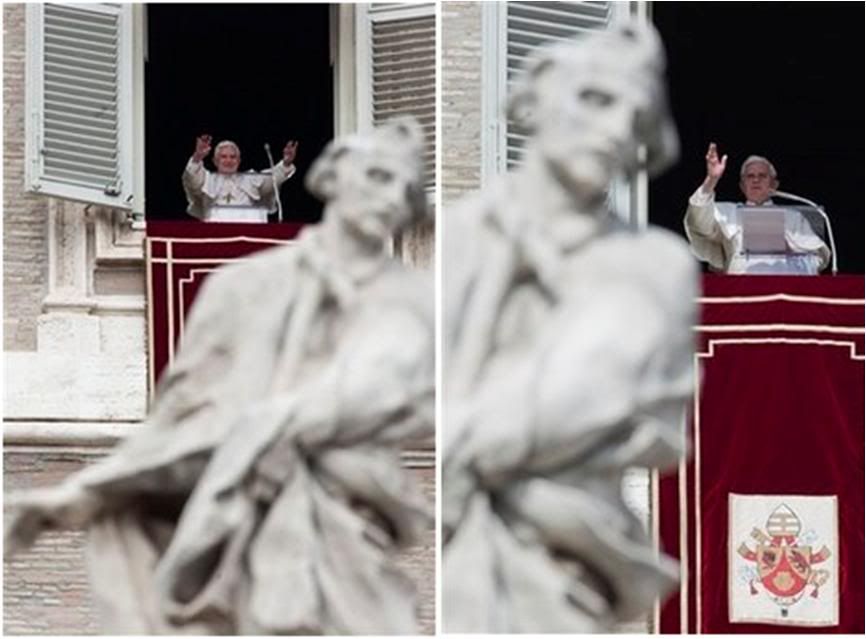
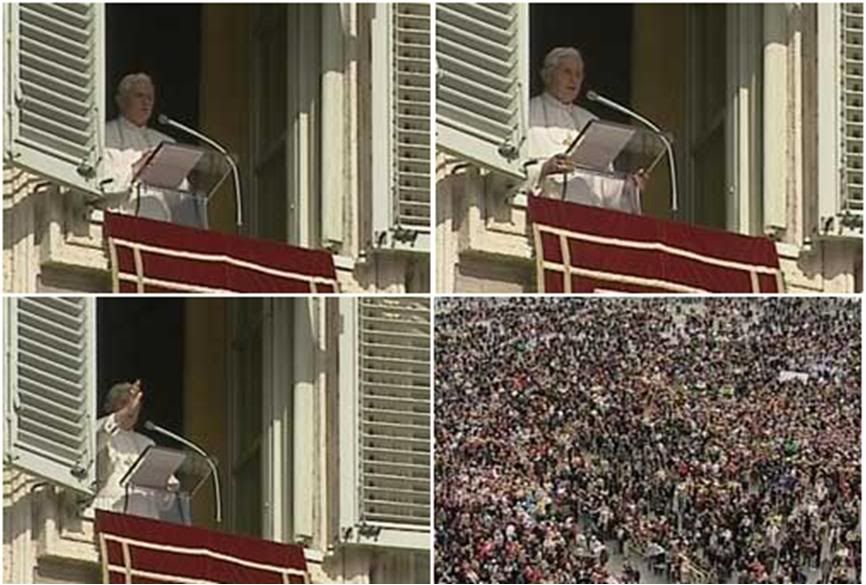 Below, Peruvians in Rome celebrated the feast of the 'Senor de los Milagros' (Lord of Miracles) and carried a Cross and an image of the Madonna in procession to St. Peter's Square
Below, Peruvians in Rome celebrated the feast of the 'Senor de los Milagros' (Lord of Miracles) and carried a Cross and an image of the Madonna in procession to St. Peter's Square
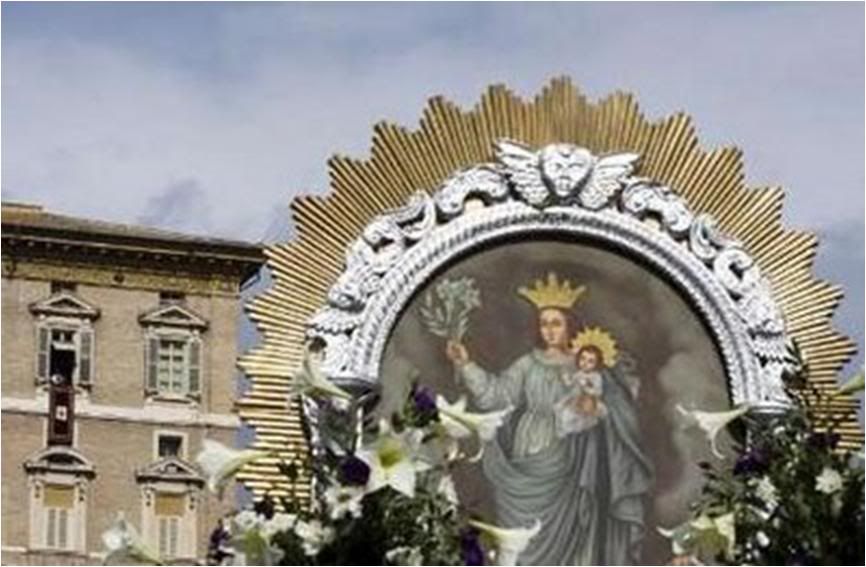
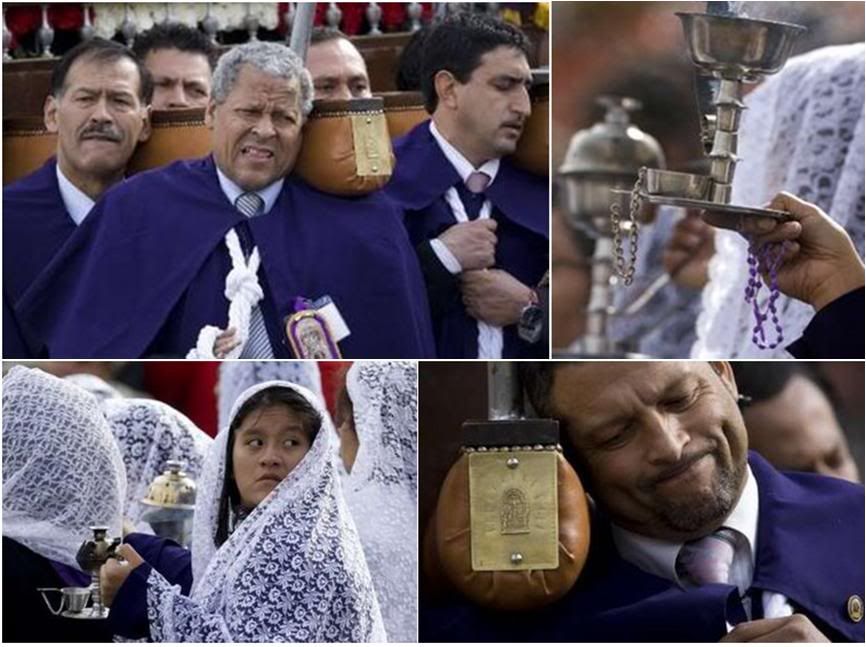
[Modificato da TERESA BENEDETTA 19/10/2009 17:01] |
| |
 19/10/2009 03:36 19/10/2009 03:36 |
|
| | | OFFLINE | | Post: 18.666
Post: 1.314 | Registrato il: 28/08/2005
Registrato il: 20/01/2009 | Administratore | Utente Veteran | |
|

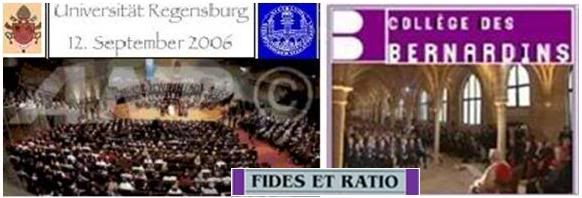 From Regensburg to the College des Bernardins:
From Regensburg to the College des Bernardins:
In the relationship between faith and reason,
truth is never simply theoretical
by Adriano Dell'Asta
Translated from
the 10/18/09 issue of

October 18, 2009
Today, Oct. 18, an international conference ends in Bergamo on the "Seekers of the eternal, creators of civilization: Monasticism in East and West", organized by the Fondazione Russia Cristiana. Here is a substantial extract from one of the papers delivered.
"Not to act according to reason is contrary to the nature of God".
That is one of the statements that is most repeated and impassioned from Benedict XVI's Regensburg lecture, because the separation of faith and reason, as history has shown, gives birth to the conditions for the destruction of man in his fullness.
It could be the idea of a God capable of doing without Logos and acting with or against Logos, an idea that has begun to make inroads among Christians themselves, in forms of voluntarism which later turn into true and proper irrationalism.
It could be the idea of man who feigns to be closed to any question that has to do with the eternal and universal, and is thus able to isolate reason from any problem that is not clearly utilitarian.
Whichever is the favored pole of such a separation - faith or reason -the outcome is always the same: The destruction of man, humiliated in his reason, because wanting to emancipate himself from God, he has limited himself to that which is 'verifiable by experiment". And offended in his faith, because wanting to preserve the purity of the divine, he pushes God off "far from us in pure and impenetrable voluntarism' and ends up rendering him extraneous to the human being and incapable of saying anything to him.
From the time man proclaimed as rationally insignificant "the fundamental questions of his reason", namely, the questions about truth and the sense of life, the inevitable outcome of such an aversion was the dissolution of the image of man.
The risk persists to this day when mankind, after the collapse of the totalitarianisms, is besieged by what Benedict XVI calls "the threatening pathologies of religion and reason" - fundamentalist violence and atheist nihilism.
One cannot but be struck by the similarity of this context with that outlined by the Russian Soloviev. Though in a completely different context - without having behind him the tragedies that the 20th century brought mankind - the great Russian philosopher noted that rational and material principles, when they claim to be emancipated from God and to be affirmable even in solitude, each to his own, can only end in self-negation, abandoning man and the world to insensibility, to idealistic reason which becomes a logical principle when, in giving matter absolute value, it transforms it into the principal subject of existence.
Indeed, this argumentation by Soloviev was not anti-modern, characterized as it was by a great respect for philosophy and the Western sciences. In this sense, instead of opposing each other, reason and faith find in Christianity, and more precisely in Christ, their authentic truth. Indeed, seeking to explain his own return to the faith, Soloviev says the motivation was precisely the demands of reason.
If one rejects the claim that reason can do without faith, it is not to defend faith but rather to save reason and have it conform to its own calling.
And such is Benedict XVI's desire when he reminds us that the goal aimed for by his reconstructing the relationship between reason and faith is certainly not a negation of modern reason but rather "a widening of our concept of reason and of its uses".
Another element one cannot but be struck with is the fact that this discourse, besides not being anti-modern at all, is made by Christians who do not judge or condemn, but make themselves co-responsible for what can happen if man is not educated to grasp his own origins and believes himself to be the master of truth.
It must not be ignored that in this respect, Benedict XVI begins his critique of modern reason by denouncing "pure and impenetrable voluntarism" which was born in late medieval Christian theology, making man and his reason count for nothing in the face of the will of God and the whims of those who claim to interpret this will.
When this presumption prevails, the Church becomes an ivory tower, itself "pure and impenetrable", which not only no longer has anything to say to the world, but also condemns it to perdition.
"The idea of perfection without grace leads to nihilism," Berdjaev wrote shortly after the 1917 Russian Revolution - and the revolutionaries were certainly guilty of such nihilism. But all those who wished to preserve the 'divine purity of earthly miseries' were no less guilty, for not being able to educate that thirst for the absolute and for justice which, having received no response from the established institutions, led to revolution.
The duty of repentance which must concern everyone at this point certainly does not mean a flattening out nor an equiparation of sins and responsibilities, nor does it imply renouncing to tell the truth or give a precise judgment on various levels of responsibility.
Just that truth is no longer an abstract argument of which man can be the creator and master, but something to which one must respond, to which one must be responsible, and which must be guarded at all costs.
The subject of guarding the truth is precisely that which opens the address that Benedict XVI would have given at La Sapienza University in January 2008, in which he would have presented himself as the pastor and overseer, the man who takes care of the community, "of the right path and the cohesion of the flock", keeping the human community united and "on the right path towards God".
Above all, it must be noted that the truth of which Benedict XVI presents himself as guardian and custodian is not the product of any theoretical elaboration. More precisely, the Pope says, "truth is never merely theoretical" - it is an experience.
In fact, the Pope "speaks as the representative of a community which guards in itself a treasure of knowledge and ethical experiences that are important for the entire human community".
This experience is precisely that of a journey, but a very particular one, because the path on which man journeys is at the same time Him towards whom the journey leads.
Truth is therefore the experience of life with Him and in Him towards whom one journeys: a life with Christ and in Christ, communion with a Truth which, being friendly to man, is Good.
Central to the discourse of the experience of truth is the continuing articulation between the certainty of the truth in one's custody and the demand of a continuing search for this same truth that no single answer can satisfy. But as Benedict XVI said at the College des Bernardins, this search for the truth is, for the Christian, never "an expedition to a trackless desert".
What allows the Christian to overcome the apparently insurmountable contradiction between the search for truth and experiencing it is, in fact, Christ who is both the companion adn the way for man's journey.
At this point, once more, we can turn to Soloviev who in one of his earlier works presented the Chalcedonian formula of 'without confusion and without separation' as the instrument to overcome the dead ends of thinking (in his case, he was speaking particularly of the Kantian opposition between phenomenon and the thing-in-itself). Beyond the immediate coincidence, one also notes that Soloviev defines this solution as the 'royal road' to knowledge.
'Royal road' seems a strange term to use, and may even seem inappropriate, except that it evokes the royal doors to the iconostasis [the wall of icons that separates the sanctuary from the rest of the church in Orthodox temples], through which pass the Gospel, the Eucharist, and therefore Christ himself, who is the way and the goal of our searching.
Above all, 'royal road' is an expression adopted by Christian tradition to describe monastic life and its principal characteristic, which is to make man's search for God overcome the dissipation of those who do not know what they are in search of, and to lead them to unite themselves to God alone.
It is therefore evident that by using this term, Soloviev was expressing the very precise idea according to which the man who desires to know reality in all its facets but without dissipation, vices, excesses, fantasies or vain thoughts - in short, in continuous search of a precise and certain goal - must follow not the private, tortuous and dangerous path of his own thinking, but that which has already been traced to lead directly to the Lord of all reality.
So, beyond a hopeless contradiction, we come to an experience of unity in which nothing is lost: a unity that starts from that of faith and reason to extend to all the spheres of being.
Soloviev's suggestion of the 'royal road' urges us on to a third discourse by Benedict XVI. Integral knowledge requires what the Russians call tselomudrie, a term which literally means 'integral knowledge' but which actually signifies 'virginity', therefore one of those principal characteristics of monastic life, which is the subject of Benedict XVI's third major discourse [on faith and reason, which he delivered at the College des Bernardins on Sept. 12, 2008, two years after the Regensburg lecture].
He opens by underscoring how the monks saved ancient culture and created out of it, a new one even if this was not their purpose. Not less underscored is the statement that Christianity is not 'a religion of the book'.
To this double insistence on the subordinate place of culture in monastic life, corresponds a series of equally repeated statements on the value of "formation of reason", of 'erudition' and even of 'grammar' as instruments without which it would have been impossible "to perceive the Word, in the midst of words".
In the same way, Benedict XVI insists on the value of interpretation. He cites an old saying, "Littera gesta docet, quid credas allegoria" ("Words demonstrate facts: what must be believed is said in allegory).
Thus we have the apparent paradox of reason, which although subordinate to faith, also is shown immediately to be indispensable for the full comprehension of the contents of the experience of faith.
But a paradox only if one has not followed Benedict XVI who has shown that opposing faith and reason to each other is fatal for man, and how such an opposition is possible only when both faith and reason are denatured - that is, when faith is understood as a violent imposition which negates reason, and when reason is understood as the free exercise of subjectivity.
The perspective opened by Benedict XVI is completely different when he explains that if 'words can kill' and one needs the Spirit, the Spirit is really 'the Spirit of the Lord', Christ, and therefore, true interpretation, far from being arbitrary, is characterized by "a link superior to the letter: the link between intellect and love".
True interpretation, just as one has said of the experience of truth, is what one has by being with Christ and walking along the way that He himself constitutes: the eternal who has entered time, the unsayable mystery which became flesh - visible, describable and reasonable - the Word made flesh.
Only such a God deserves to be proclaimed because, Benedict XVI says, "a God who is simply thought up and invented is not a God". But "the novelty of the Christian announcement does not consist in a thought but in a fact: He showed himself. Not a blind fact but a fact which is Logos itself".
This fact is reasonable, but reason should have the humility to accept it and not presume to be its creator and master. In this way, a space of freedom opens up that is not one of randomness or absence of links, but, rather one of love.
Even the subject of the Christian announcement, its credibility, and more important, its possibility, can be seen in the particular light of the Russian experience in the 20th century.
The triumph of ideology and the millions of deaths which that fact produced in the two totalitarian experiences of Nazism and Communism seem to have made impossible and even unacceptable not just any announcement of truth but even any discourse over truth, which was used as a claim to a mastery over reality and, in these totalitarian regimes, the destruction of truth itself.
This claim to dominion was so totalizing and destructive that the evil arising from it had no alternative but an equally totalizing rejection of any truth whatsoever.
When Theodor Adorno made his famous aphorism over the impossibility of writing any more poetry after Auschwitz, he was conditioned precisely by the apparent insurmountability of the alternative: In the face of the extreme experiences of the 20th century, in the face of pain and 'atrocious death', any form of expression (esthetic or otherwise, it makes no difference) would seem an outrage to suffering, like an attempt to annul the scandal of the unspeakable by speaking it out and thus placing it at our disposition.
Behind this fear lay hidden a new form of iconoclasm which ends up once again by denying that the infinite can be demonstrated through the finite.
To this dispute over the possibility of speaking the truth, never more radical than in times of iconoclasm, the experience of the concentration camps, as narrated in great Russian literature, has given a similarly radical answer: the century has told us that men can remain men - the unsayable has been said, that man has within him something infinite and irreducible, precisely where everything seemed to have come to an end and where it seemeed that the most total reduction of man himself had been realized.
But the unsayable that was said was not created by man as a new form of ideological domination, as Adorno feared, who could not conceive an interpretation that is free but not arbitrary, nor a truth that is incontrovertible but not totalitarian: this unsayable, which defines man as he most properly is, is something man cannot even imagine.
Just as authentic interpretation is possible by not substituting nor negating mystery but trusting in it, so is the art of giving space to the infinite and to the mystery that makes things worthy to be preserved: the art of 'the immortality of life", in the words of Varlam Shalamov [Russian writer, poet and Gulag survivor, 1907-1982].
[Modificato da TERESA BENEDETTA 19/10/2009 15:46] |
| |
 19/10/2009 15:44 19/10/2009 15:44 |
|
| | | OFFLINE | | Post: 18.667
Post: 1.315 | Registrato il: 28/08/2005
Registrato il: 20/01/2009 | Administratore | Utente Veteran | |
|

 Oct. 19, Monday
Oct. 19, Monday
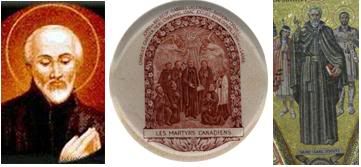 ST. ISAAC JOGUE & COMPANIONS
ST. ISAAC JOGUE & COMPANIONS
French missionaries and martyrs (d Canada, 1646-1648)
First martyrs in North America (beheaded by various Indian tribes)
No OR today.
THE POPE'S DAY
The Holy Father met today with
- H.E. Yves Gazzo, who presented his credentials as Head of the European Commission delegation
(equivalent to an embassy) to the Holy See. Address in French.
- Mons. Renzo Fratini, Apostolic Nuncio in Spain and the Principality of Andorra, and permanent observer
of the Holy See at the World Tourism Organization
- H.E. Muammer Doğan Akdur, Ambassador from Turkey, farewell visit
- H.E. Fausto Cordovez Chiriboga, Ambassador from Ecuador, farewell visit.
The Synodal assembly for Africa has no general congregation today.
The working groups are holding their sessions.
The next general congregation will take place tomorrow morning.
Goodness! I was so distracted this morning by some unexpected 'problems' I forgot this:
'MONTHLY ANNIVERSARY'


FOUR AND A HALF YEARS, AND COUNTING....
AD MULTOS ANNOS, SANCTO PATER!
THANK YOU FOR ALL YOU ARE
TO THE CHURCH, TO THE WORLD, TO ALL OF US.

[Modificato da TERESA BENEDETTA 19/10/2009 16:56] |
| |
 19/10/2009 17:39 19/10/2009 17:39 |
|
| | | OFFLINE | | Post: 18.668
Post: 1.316 | Registrato il: 28/08/2005
Registrato il: 20/01/2009 | Administratore | Utente Veteran | |
|

 Pope to EU Ambassador:
Pope to EU Ambassador:
Christian values continue
to shape European civilization

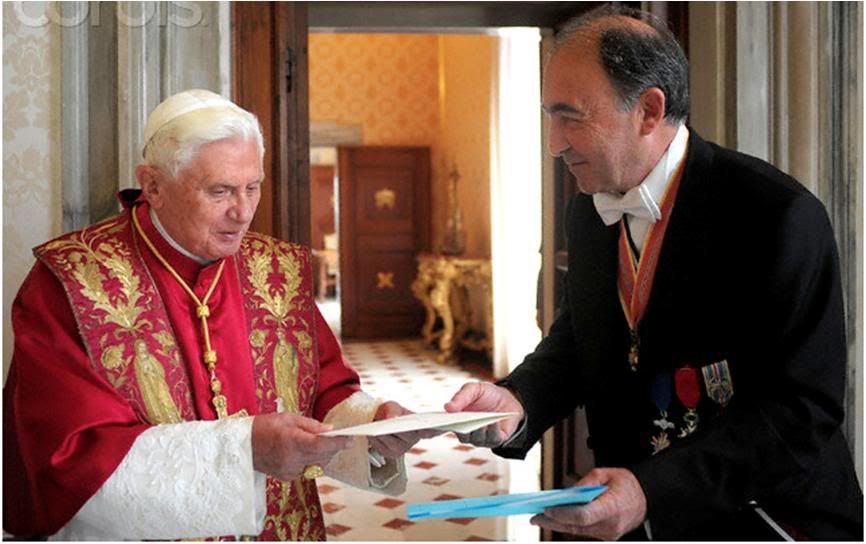
VATICAN CITY, 19 OCT 2009 (VIS) - This morning the Holy Father received the Letters of Credence of Yves Gazzo, head of the delegation to the Holy See of the Commission of the European Communities [also known as the European Commission].
In his address, the Pope referred to the values of the European Union which, he said, "are the fruit of a long and complex history in which, it cannot be denied, Christianity has played a primordial role. The equal dignity of all human beings, the freedom of expression of faith as the basis of all other civil liberties, peace as a decisive element of the common good, human development (intellectual, social and economic) as a divine vocation and the sense of history deriving therefrom, are all central elements of the Christian revelation that continues to mould European civilisation".
"When the Church mentions the Christian roots of Europe", the Holy Father went on, "she does not seek a privileged status for herself. She wishes to enact historical memory, first and foremost by recalling a truth which is suffering ever greater neglect: the decisively Christian inspiration of the founding fathers of the European Union".
Furthermore, "she wishes to make it clear that the legacy of values comes chiefly from Christian heritage, which continues to nourish Europe today".
"These values are not some anarchic or random assembly, rather they form a coherent whole which is historically ordered and regimented on the basis of a precise view of mankind".
The Holy Father then went on to highlight the risk of such values being "manipulated by individuals and pressure groups who seek to make their particular interests prevail to the detriment of an ambitious collective project, which is what Europeans hope to see and which aims at the common good of all inhabitants of the continent, and of the whole world".
"It is important", he went on, "that Europe does not allow her model of civilisation to fray, thread by thread. Her generosity must not be stifled by individualism or utilitarianism. The immense intellectual, cultural, economic riches of the continent will continue to bear fruit so long as they are nourished by a transcendental view of human beings, which is the greatest treasure of European heritage".
"This mainly involves the search for a just and delicate balance between economic efficiency and social needs, the protection of the environment and, above all, the indispensable and necessary support for human life from conception to natural death, and for the family founded on marriage between a man and a woman".
Europe will not truly be itself, said the Holy Father, "if she does not conserve the originality which constitutes her greatness and which tomorrow may make her one of the main players in promoting the integral development of peoples, something the Catholic Church considers as being the only possible way to remedy the imbalances of our world".
Benedict XVI assured the new head of delegation that the Holy See "follows the activities of European institutions with great respect and attention, and hopes that, with their work and creativity, they may honour Europe which, more than a continent, is a 'spiritual home'".
"The Church", he concluded, "wishes to 'accompany' the construction of European unity. For this reason she takes the liberty of recalling the fundamental and constituent values of European society, that they may be promoted for the good of everyone".
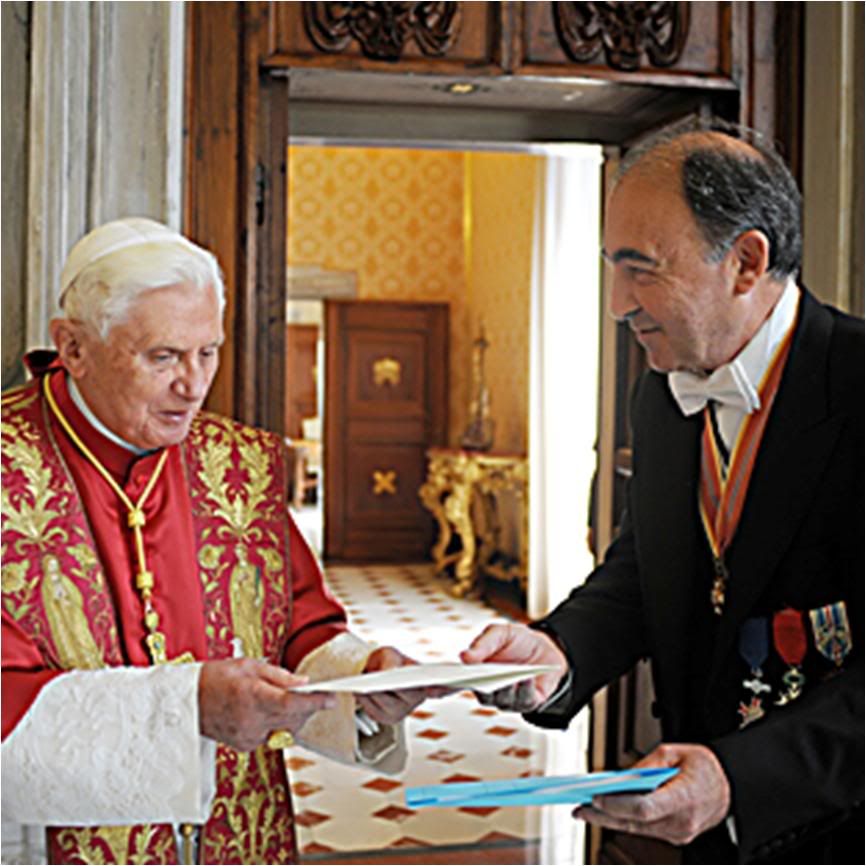 Here is a translation of the Holy Father's remarks, delivered in French, to the new ambassador:
Here is a translation of the Holy Father's remarks, delivered in French, to the new ambassador:
THE HOLY FATHER'S REMARKS
Mr. Ambassador,
I am happy to receive Your Excellency aND to accredit you as the representative of the Commission of the European Communities to the Holy See. I would appreciate it if you could express to H.E. Jose Barroso, who has just been re-elected President of the Commission, my cordial wishes for himself and for the new mandate which has been given to him, as well as for all his collaborators.
This year, Europe commemorates the 20th anniversary of the fall of the Berlin Wall. I wished to mark this event specially with my visit to the Czech REpublic. In that land which was sorely tested by the yoke of a painful ideology, I was able to give thanks for the gift of freedom recovered which has allowed the European continent to restore its integrity and unity.
You have just described, Mr. Ambassador, the reality of the European Union as "a zone of peace and stability which brings together 27 states with the same fundamental values". It is a happy presentation.
Nonetheless, it is right to point out that the European Union was not endowed with these values, but that these were the shared values that caused it to be born and which have been the gravitational force that attracted towards the founding nations those others which succeessively joined it in the course of time.
These values are the outcome of a long and sinuous history in which - no one will deny it - Christianity played a foreground role.
The equal dignity of all human beings, the freedom of the act of faith as the root of all other civilian liberties, peace as a decisive element of the common good, human development - intellectual, social and economic - as a divine vocation (cf. Caritas in Veritate, n. 16-19), and the historical significance that flows from all this are also the central elements of Christian Revelation which continue to shape European civilization.
When the Church recalls the Christian roots of Europe, it is not looking for a privileged status for itself. It wishes to exercise historical memory in recalling first of all one truth - which is increasingly ignored - namely, the definitively Christian inspiration of the Founding Fathers of the European Union.
More profoundly, the Church also wishes to manifest that the firm base of these values comes principally from the Christian heritage which continues to nourish it.
These common values do not constitute an anarchic or random aggregate, but they form a coherent ensemble which is well-ordered and articulated historically, starting from a precise anthropological vision.
Can Europe ignore the original organic principle of its values which have revealed to man both his eminent dignity and the fact that his personal calling opens him to all other men with whom he is called on to constitute one single family?
In allowing herself to forget this, does she not risk seeing these great and beautiful values come into competition or conflict with each other?
Or are not these values at risk of being instrumentalized by individuals and pressure groups wanting to promote their special interests to the detriment of any ambitious common plan - which Europeans expect - concerned with the common good of the inhabitants of the Continent, and of the whole world together?
This danger has been perceived and denounced by a number of observers coming from very different horizons. It is important that Europe does not allow its model of civilization to fall apart, piece by piece. Its original momentum should not be stifled by individualism or utilitarianism.
The immense intellectual, cultural and economic resources of the continent will continue to bear fruit it they remain fertilized by the transcendent vision of the human being that is the most precious treasure of the European heritage.
This humanist tradition, in which there are several families of thought that are also quite diverse, makes Europe capable of facing the challenges of tomorrow and to respond to the expectations of its population.
These have to do principally with the search for the correct but delicate equilibrium between economic efficiency and social demands, of safeguarding the environment, and above all, the indispensable anc necessary support of human life from conception to natural death and of the family founded on marriage between a man and woman.
Europe will not be truly herself if it can conserve the originality which made it great, and which can make her, tomorrow, one of the major players in the promotion of the integral development of persons that the Catholic Church considers to be the only way that lends itself to correcting the imbalances present in our world.
For all these reasons, Mr. Ambassador, the Holy See follows with respect and great attention the activities of the European institutions, with the hope that these, through their work and crativity, may honor the Europe which is more than a continent, but a 'spiritual home' (cf. Address to civilian authorities and the diplomatic corps, Prague, Sept. 26, 2009).
The Church desires to be a companion in the construction of the European Union. That is why she allows herself to remind the Union of the founding and constitutive values of European society so that they may be promoted for the good of all.
At this time when you begin your mission to the Holy See, I wish to renew the expression of my satisfaction for the excellent relations between the Ruopean communities and the Holy See, and I extend to you, Mr. Ambassador, my best wishes for the achievement of your noble responsibility. You can be sure that you will find the welcome and the understanding that you may need from my collaborators.
On your Excellency, your family and your co-workers, I invoke the abundance of divine blessings.
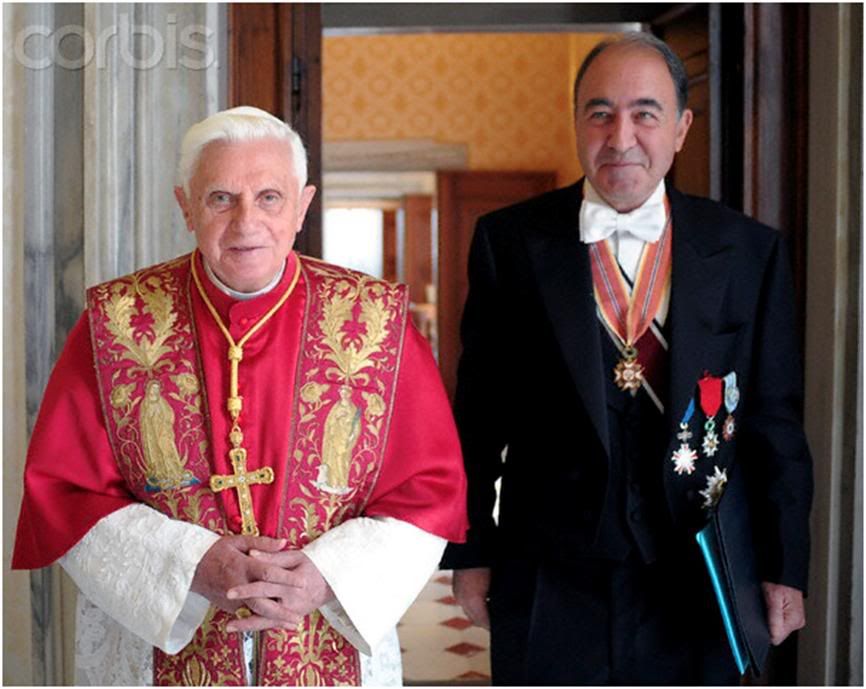
[Modificato da TERESA BENEDETTA 20/10/2009 15:47] |
| |
 20/10/2009 02:04 20/10/2009 02:04 |
|
| | | OFFLINE | | Post: 18.669
Post: 1.317 | Registrato il: 28/08/2005
Registrato il: 20/01/2009 | Administratore | Utente Veteran | |
|

 Pope preparing to welcome
Pope preparing to welcome
500,000 traditional Anglicans
back into the Church?
by Salvatore Izzo

VATICAN CITY, Oct. 19 (Translated from AGI) - Papa Ratzinger is probably preparing to receive into full communion with Rome the bishops, priests and faithful belonging to the Traditional Anglican Communion, a group that has for some time broken communion with the Archbishop of Canterbury, and since 2007, have been asking to be admitted 'as a bloc' to the Roman Catholic Church.
The TAC numbers around 500,000.
This move, which has been anticipated since January 2009 by the Australian media (the TAC Primate, Mons. John Hepsworth, is the Anglican Bishop of Perth), may finally be confirmed at a news briefing at the Vatican tomorrow to be held by Cardinal William Levada, Prefect of the Congregation for the Doctrine of the Faith, "on a matter relating to relations with the Anglicans".
Also with Cardinal Levada at the briefing will be Archbishop Augustien Di Noia, secretary of the Congregation for Divine Worship.
Sources say that the TAC prelates have already signed a profession of adherence to the Catechism of the Catholic Church which they have deposited a Marian sanctuary in England [possibly the Shrine of Our Lady of Walsingham in Norfolk, who is thepatron of the TAC}.
Once in the Roman Catholic fold, the TAC would retain the right to use Anglican liturgy which, as the TAC practises it, is very close to the Tridentine Catholic Mass. They would keep married priests, but not married bishops, as in the Orthodox Church, where only celibates can be bishops.
Equally important, the TAC priests will need to be re-ordained under Catholic rites, as the Church does not recognize Anglican Holy Orders. This has been SOP for a number of Anglican bishops and priests who have 'returned' to Rome in recent years.
The traditionalist Italian site messainlatino.it observes that "This reunification will have upsetting effects far beyond the TAC, serving as an example to numerous Anglican groups who have remained within the Anglican Communion (Lambeth Conference) and therefore loyal to Canterbury, who are strongly uneasy about the recent elevation of women to be bishops after allowing them to the priesthood in the 1990s".
According to Damian Thompson, editor of the British Catholic Herald, the TAC could be given the status of a personal prelature similar to the Opus Dei. [Also the status that the Lefebvrians would eventually like to have once they are in full communion with Rome. The jurisdiction of a personal prelature, unlike a diocese, is not delimited by territory but by its membership, wherever they live. While a personal prelature is not under the jursidiction of whiever diocese their members happen to live in, it is under the supervision of the Congregation for Bishops like regular dioceses and military ordinariates. .]
Thus, it would be like a worldwide diocese with its own bishop and apostolate. similar to what is hypothesized for the FSSPX.

The January 2009 story in The Australian newspaper The Record gives more background on the TAC,
and may be seen on
freeforumzone.leonardo.it/discussione.aspx?idd=354498&p=114
In July 2008, the TAC made public a letter from Cardinal Levada
in which he said th CDF was studying the TAC proposals.
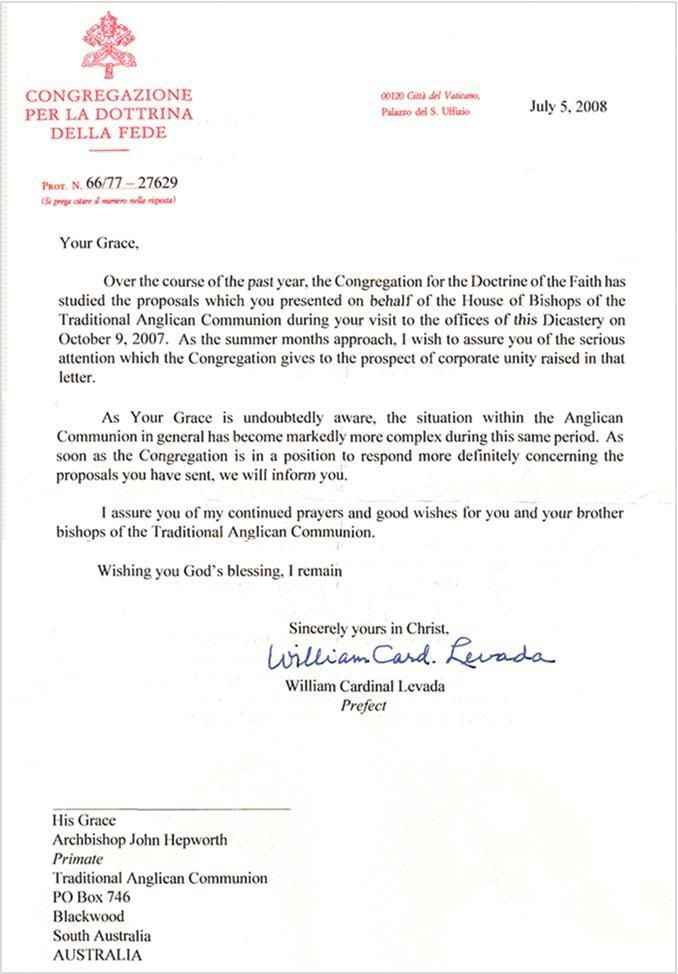
P.S. According to Damian Thompson today

Oct. 19, 2009
And this, from the Archbishop of Canterbury’s office:
PRESS CONFERENCE INVITATION
(not for publication)
You are invited to a press conference with Archbishop Vincent Nichols (Archbishop of Westminster) and Archbishop Rowan Williams (Archbishop of Canterbury) on Tuesday 20 October at 1000. The press conference will take place at 39 Eccleston Square, London SW1V 1BX.
Clearly, the Vatican news briefing and this unusual joint press conference
are related, if not coordinated.
THIS NEWS HAS TO BE THE MOST SIGNIFICANT EVENT OF ITS KIND
SINCE THE CHURCH OF ENGLAND BROKE OFF FROM ROME IN THE 16TH CENTURY.
But what can the Archbishop of Canterbury say to put the best spin he can
on this mass defection from the Anglican Communion?
[Modificato da TERESA BENEDETTA 22/10/2009 10:18] |
| |
 20/10/2009 12:32 20/10/2009 12:32 |
|
| | | OFFLINE | | Post: 18.671
Post: 1.319 | Registrato il: 28/08/2005
Registrato il: 20/01/2009 | Administratore | Utente Veteran | |
|

 Tuesday, Oct. 20
Tuesday, Oct. 20
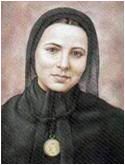 ST. MARIA BERTILLA BOSCARDIN (Italy, 1888-1922)
ST. MARIA BERTILLA BOSCARDIN (Italy, 1888-1922)
Nun, Teaching Sisters of Charity
A simple person who called herself a goose,
became an outstanding nursing sister for
World War I wounded and children.
Canonized in 1961.
OR for 10/19-10/20:

At the Sunday Angelus, the Pope pays homage to missionaries on World Mission Day:
'The Kingdom of God in the world is the power of love and freedom'
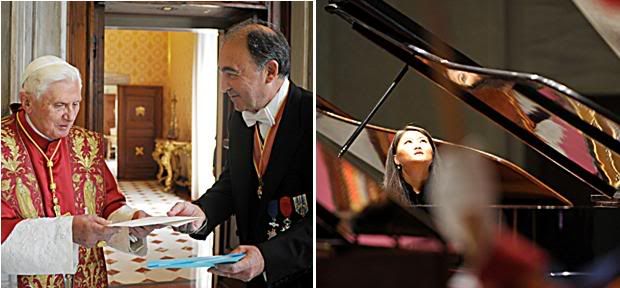
This double issue also contains the texts of the Pope's address yesterday to the new ambassador from
the European Commission (left photo above), saying Europe should not allow its Christian model of
civilization to come undone; and after the Saturday recital in his honor by Chinese pianist Jin Ju.
Other Page 1 stories: The Synodal assembly for Africa prepares its final propositions; and Iranian
anti-government bomb attack hardens Tehran's position at Vienna talks about its nuclear program.
No events scheduled for the Holy Father today.
POPE APPROVES APOSTOLIC CONSTITUTION
FOR ANGLICANS RETURNING TO THE CHURCH
This was the gist of the announcement made simultaneously today at the Vatican by Cardinal William Levada
and in London by the Archbishop of Westminster (Catholics) and Archbishop of Canterbury (Anglican).
Stories below.
|
| |
 20/10/2009 12:40 20/10/2009 12:40 |
|
| | | OFFLINE | | Post: 18.672
Post: 1.319 | Registrato il: 28/08/2005
Registrato il: 20/01/2009 | Administratore | Utente Veteran | |
|

 Pope Benedict creates new Church structure
Pope Benedict creates new Church structure
for Anglicans who want to join Catholic Church

VATICAN CITY, Oct. 20 (AP) — Pope Benedict XVI has has created a new church structure for Anglicans who want to join the Roman Catholic Church.
Cardinal Joseph Levada, the Vatican's chief doctrinal official, said Tuesday the new legal entity will allow Anglicans to join the Catholic Church while maintaining their Anglican identity and many of their liturgical traditions.
Levada said the new structure is a response to the many requests that have come to the Vatican over the years from Anglicans who want to join.
Many Anglicans have become disillusioned by the ordination of women, the election of openly gay bishops and the blessing of same-sex unions in the 77-million strong Anglican Communion.
Pope approves document
on Anglicans joining Church

VATICAN CITY, Oct. 20 (Reuters) – Pope Benedict has approved a document that would make it easier for Anglicans to join the Roman Catholic Church.
The move comes after years of discontent in the 70 million-strong worldwide Anglican community about the liberal attitudes of some parts of the church toward women priests and homosexual bishops.
The Vatican said on Tuesday that the document, known as an "apostolic constitution," would provide a structure for Anglicans who want to join Catholicism, either individually or in groups, while maintaining some of their own traditions.
The move was announced at simultaneous news conferences in Rome and London.
The Vatican said the Pope decided to prepare the document to respond "to the many requests that have been submitted to the Holy See from groups of Anglican clergy and faithful in different parts of the world who wish to enter into full visible communion."
The news was less dramatic than anticipated but far broader in impact - because the new Apostolic Constitution does not just cover the Traditional Anglican Communion but any and all Anglican groups who may wish to re-enter into communion with Rome.
It remains to be seen what the next step will be for TAC which has been ready to 'make the crossing' for the past two years... And I wonder how the FSSPX takes this, in post-Vatican II terms?
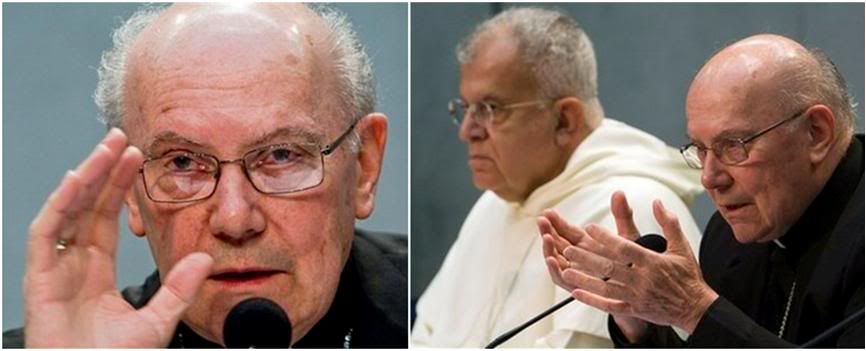 Cardinal Levada and Mons. DiNoia at the news briefing today.
Here is the text of the CDF note about the new Apostolic Constitution for returning Anglicans:
THE CDF NOTE
Cardinal Levada and Mons. DiNoia at the news briefing today.
Here is the text of the CDF note about the new Apostolic Constitution for returning Anglicans:
THE CDF NOTE
 With the preparation of an Apostolic Constitution, the Catholic Church is responding to the many requests that have been submitted to the Holy See from groups of Anglican clergy and faithful in different parts of the world who wish to enter into full visible communion.
With the preparation of an Apostolic Constitution, the Catholic Church is responding to the many requests that have been submitted to the Holy See from groups of Anglican clergy and faithful in different parts of the world who wish to enter into full visible communion.
In this Apostolic Constitution the Holy Father has introduced a canonical structure that provides for such corporate reunion by establishing Personal Ordinariates, which will allow former Anglicans to enter full communion with the Catholic Church while preserving elements of the distinctive Anglican spiritual and liturgical patrimony.
Under the terms of the Apostolic Constitution, pastoral oversight and guidance will be provided for groups of former Anglicans through a Personal Ordinariate, whose Ordinary will usually be appointed from among former Anglican clergy.
The forthcoming Apostolic Constitution provides a reasonable and even necessary response to a world-wide phenomenon, by offering a single canonical model for the universal Church which is adaptable to various local situations and equitable to former Anglicans in its universal application.
It provides for the ordination as Catholic priests of married former Anglican clergy. Historical and ecumenical reasons preclude the ordination of married men as bishops in both the Catholic and Orthodox Churches. The Constitution therefore stipulates that the Ordinary can be either a priest or an unmarried bishop.
The seminarians in the Ordinariate are to be prepared alongside other Catholic seminarians, though the Ordinariate may establish a house of formation to address the particular needs of formation in the Anglican patrimony.
In this way, the Apostolic Constitution seeks to balance on the one hand the concern to preserve the worthy Anglican liturgical and spiritual patrimony and, on the other hand, the concern that these groups and their clergy will be integrated into the Catholic Church.
Cardinal William Levada, Prefect of the Congregation for the Doctrine of the Faith which has prepared this provision, said: "We have been trying to meet the requests for full communion that have come to us from Anglicans in different parts of the world in recent years in a uniform and equitable way. With this proposal the Church wants to respond to the legitimate aspirations of these Anglican groups for full and visible unity with the Bishop of Rome, successor of St. Peter."
These Personal Ordinariates will be formed, as needed, in consultation with local Conferences of Bishops, and their structure will be similar in some ways to that of the Military Ordinariates which have been established in most countries to provide pastoral care for the members of the armed forces and their dependents throughout the world.
"Those Anglicans who have approached the Holy See have made clear their desire for full, visible unity in the one, holy, catholic and apostolic Church. At the same time, they have told us of the importance of their Anglican traditions of spirituality and worship for their faith journey," Cardinal Levada said.
The provision of this new structure is consistent with the commitment to ecumenical dialogue, which continues to be a priority for the Catholic Church, particularly through the efforts of the Pontifical Council for the Promotion of Christian Unity.
"The initiative has come from a number of different groups of Anglicans," Cardinal Levada went on to say: "They have declared that they share the common Catholic faith as it is expressed in the Catechism of the Catholic Church and accept the Petrine ministry as something Christ willed for the Church. For them, the time has come to express this implicit unity in the visible form of full communion."
According to Levada:
"It is the hope of the Holy Father, Pope Benedict XVI, that the Anglican clergy and faithful who desire union with the Catholic Church will find in this canonical structure the opportunity to preserve those Anglican traditions precious to them and consistent with the Catholic faith. Insofar as these traditions express in a distinctive way the faith that is held in common, they are a gift to be shared in the wider Church.
"The unity of the Church does not require a uniformity that ignores cultural diversity, as the history of Christianity shows. Moreover, the many diverse traditions present in the Catholic Church today are all rooted in the principle articulated by St. Paul in his letter to the Ephesians: ‘There is one Lord, one faith, one baptism’ (4:5). Our communion is therefore strengthened by such legitimate diversity, and so we are happy that these men and women bring with them their particular contributions to our common life of faith."
Background information
Since the sixteenth century, when King Henry VIII declared the Church in England independent of Papal Authority, the Church of England has created its own doctrinal confessions, liturgical books, and pastoral practices, often incorporating ideas from the Reformation on the European continent. The expansion of the British Empire, together with Anglican missionary work, eventually gave rise to a world-wide Anglican Communion.
Throughout the more than 450 years of its history the question of the reunification of Anglicans and Catholics has never been far from mind. In the mid-nineteenth century the Oxford Movement (in England) saw a rekindling of interest in the Catholic aspects of Anglicanism.
In the early twentieth century Cardinal Mercier of Belgium entered into well publicized conversations with Anglicans to explore the possibility of union with the Catholic Church under the banner of an Anglicanism "reunited but not absorbed".
At the Second Vatican Council hope for union was further nourished when the Decree on Ecumenism (n. 13), referring to communions separated from the Catholic Church at the time of the Reformation, stated that: "Among those in which Catholic traditions and institutions in part continue to exist, the Anglican Communion occupies a special place."
Since the Council, Anglican-Roman Catholic relations have created a much improved climate of mutual understanding and cooperation. The Anglican-Roman Catholic International Commission (ARCIC) produced a series of doctrinal statements over the years in the hope of creating the basis for full and visible unity.
For many in both communions, the ARCIC statements provided a vehicle in which a common expression of faith could be recognized. It is in this framework that this new provision should be seen.
In the years since the Council, some Anglicans have abandoned the tradition of conferring Holy Orders only on men by calling women to the priesthood and the episcopacy.
More recently, some segments of the Anglican Communion have departed from the common biblical teaching on human sexuality — already clearly stated in the ARCIC document "Life in Christ" — by the ordination of openly homosexual clergy and the blessing of homosexual partnerships.
At the same time, as the Anglican Communion faces these new and difficult challenges, the Catholic Church remains fully committed to continuing ecumenical engagement with the Anglican Communion, particularly through the efforts of the Pontifical Council for the Promotion of Christian Unity.
In the meantime, many individual Anglicans have entered into full communion with the Catholic Church. Sometimes there have been groups of Anglicans who have entered while preserving some "corporate" structure. Examples of this include, the Anglican diocese of Amritsar in India, and some individual parishes in the United States which maintained an Anglican identity when entering the Catholic Church under a "pastoral provision" adopted by the Congregation for the Doctrine of the Faith and approved by Pope John Paul II in 1982.
In these cases, the Catholic Church has frequently dispensed from the requirement of celibacy to allow those married Anglican clergy who desire to continue ministerial service as Catholic priests to be ordained in the Catholic Church.
In the light of these developments, the Personal Ordinariates established by the Apostolic Constitution can be seen as another step toward the realization the aspiration for full, visible union in the Church of Christ, one of the principal goals of the ecumenical movement.
It is obvious the Vatican does not wish this papal initiative to be seen as a weakening of the ecumenical cause in favor of, say, openly campaigning for members of other Christian confessions to rejoin the Church. Also obviously, the Archbishop of Canterbury, as de facto head of the worldwide Anglican Communion, was consulted about this step.
But one cannot imagine such an initiative, for instance, with the Orthodox Church, where a) there is not the widespread dissatisfaction with the home church's dogma as there is in the Anglican Communion, and b) hardliners like the Moscow patriarchate would consider it outright and unacceptable 'proselytism'!
Here is the joint statement by the Archbishops of Westminster (Catholic) and Canterbury (Anglican) at their news conference today, which frames the papal initiative in the context of the ecumenical dialog:
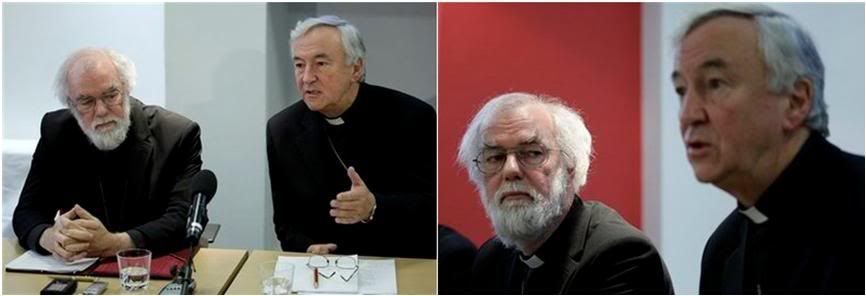 Archbishops Williams and Nichols at today's news conference.
JOINT STATEMENT BY
Archbishops Williams and Nichols at today's news conference.
JOINT STATEMENT BY
THE ARCHBISHOP OF WESTMINSTER
AND THE ARCHBISHOP OF CANTERBURY
Today’s announcement of the Apostolic Constitution is a response by Pope Benedict XVI to a number of requests over the past few years to the Holy See from groups of Anglicans who wish to enter into full visible communion with the Roman Catholic Church, and are willing to declare that they share a common Catholic faith and accept the Petrine ministry as willed by Christ for his Church.
Pope Benedict XVI has approved, within the Apostolic Constitution, a canonical structure that provides for Personal Ordinariates, which will allow former Anglicans to enter full communion with the Catholic Church while preserving elements of distinctive Anglican spiritual patrimony.
The announcement of this Apostolic Constitution brings to an end a period of uncertainty for such groups who have nurtured hopes of new ways of embracing unity with the Catholic Church. It will now be up to those who have made requests to the Holy See to respond to the Apostolic Constitution.
The Apostolic Constitution is further recognition of the substantial overlap in faith, doctrine and spirituality between the Catholic Church and the Anglican tradition. Without the dialogues of the past forty years, this recognition would not have been possible, nor would hopes for full visible unity have been nurtured. In this sense, this Apostolic Constitution is one consequence of ecumenical dialogue between the Catholic Church and the Anglican Communion.
The on-going official dialogue between the Catholic Church and the Anglican Communion provides the basis for our continuing cooperation. The Anglican Roman Catholic International Commission (ARCIC) and International Anglican Roman Catholic Commission for Unity and Mission (IARCCUM) agreements make clear the path we will follow together.
With God’s grace and prayer we are determined that our on-going mutual commitment and consultation on these and other matters should continue to be strengthened.
Locally, in the spirit of IARCCUM, we look forward to building on the pattern of shared meetings between the Catholic Bishops Conference of England and Wales and the Church of England’s House of Bishops with a focus on our common mission.
Joint days of reflection and prayer were begun in Leeds in 2006 and continued in Lambeth in 2008, and further meetings are in preparation. This close cooperation will continue as we grow together in unity and mission, in witness to the Gospel in our country, and in the Church at large.
London, 20 October 2009
+ Vincent Gerard Nichols
+ Rowan Williams
Damian Thompson's first report on the story for The Daily Telegraph, which gives the story a misleading headline:
Pope announces plans for
Anglicans to convert en masse
By Damian Thompson

Oct. 20, 2009
The Vatican has announced that Pope Benedict is setting up special provisions for Anglicans, including married clergy, who want to convert to Rome together, preserving aspects of Anglican liturgy. They will be given their own pastoral supervision, according to this press release from the Vatican:
“In this Apostolic Constitution the Holy Father has introduced a canonical structure that provides for such corporate reunion by establishing Personal Ordinariates which will allow former Anglicans to enter full communion with the Catholic Church while preserving elements of the distinctive Anglican spiritual and liturgical patrimony.”
More on this very important story later. But this is clearly a historic gesture by Pope Benedict which will encourage thousands of disaffected Anglicans to become Roman Catholics.
Vatican reveals plan
to welcome disaffected Anglicans

Oct. 20, 2009
In a move with potentially sweeping implications for relations between the Catholic church and some 80 million Anglicans worldwide, the Vatican has announced the creation of new ecclesiastical structures to absorb disaffected Anglicans wishing to become Catholics. The structures will allow those Anglicans to hold onto their distinctive spiritual practices, including the ordination of married former Anglican clergy as Catholic priests.
Those structures would be open to members of the Episcopal Church in the United States, the main American branch of the worldwide Anglican Communion. American Episcopalians are said to number some 2.2 million.
The announcement came this morning in Rome in a news conference with two Americans: Cardinal William Levada, Prefect of the Congregation for the Doctrine of the Faith, and Archbishop Augustine Di Noia, Secretary of the Congregation for Divine Worship and the Discipline of the Sacraments.
Though the announcement did not single out any specific group of Anglicans, it responds to a request made two years ago by a breakaway group known as the “Traditional Anglican Communion,” a network claiming to represent some 400,000 Anglicans worldwide, including more than 5,000 in the United States, unhappy with liberalizing moves in the Anglican Communion, including the ordination of women as priests and bishops, the ordination of openly gay clergy and bishops, and the blessing of same-sex unions.
Rather than absorbing that bloc en masse, today's move creates the possibility that bishops' conferences around the world can create personal ordinariates, a special structure that's tantamount to a non-territorial diocese, to accept Anglicans under the leadership of a former Anglican minister who would be designated a bishop.
According to a Vatican “note” released this morning, former Anglican clergy who are married may serve as priests in the new ordinariates, but they may not be ordained as bishops. Seminarians for the new ordinariates must be trained alongside other Catholic seminarians, though they may have separate houses of formation.
The details will be presented in a new apostolic constitution from Pope Benedict XVI, expected to be issued shortly. Popes issue apostolic onstitutions in order to amend the church's Code of Canon Law, in this case to create new legal structures.
The Vatican note described the new “personal ordinariates” as similar to the structures created throughout the world to provide pastoral care for members of the military and their families. The structures are in effect separate dioceses, presided over by a bishop and with their own priests, seminarians, and faithful.
A personal ordinariate is also similar to the canonical status of “personal prelature,” currently held by only one Catholic group: Opus Dei.
The note said the ordinariates will be created in consultation with the national bishops’ conference of a given country. Importantly, the apostolic constitution apparently will not itself erect any new structures; it will instead make them possible "as needed", but it will apparently be up to local bishops to decide if such a structure will be created in any given country.
Such an opening to disgruntled Anglican conservatives has long been rumored, with some fearing potentially negative repercussions in relations with the Anglican Communion – whose leadership might see it as “poaching.”
Last week, Cardinal Walter Kasper, the Vatican’s top ecumenical official, went out of his way during a Vatican news conference to insist that, “We are not fishing in the Anglican lake.” Yet out of respect for freedom of religion, Kasper said, the Catholic church has a responsibility to respond when someone knocks on its door.
In an unusual move, the Vatican this morning issued a joint statement from the Catholic Archbishop of Westminster, Vincent Nichols, and the Anglican Archbishop of Canterbury, Rowan Williams, attempting to calm the waters.
“The apostolic constitution [creating the new structures] is further recognition of the substantial overlap in faith, doctrine and spirituality between the Catholic Church and the Anglican tradition,” that statement said. “Without the dialogues of the past forty years, this recognition would not have been possible, nor would hopes for full visible unity have been nurtured. In this sense, this apostolic constitution is one consequence of ecumenical dialogue between the Catholic Church and the Anglican Communion.”
“With God’s grace and prayer, we are determined that our on-going mutual commitment and consultation on these and other matters should continue to be strengthened,” Nichols and Williams said.
The Vatican’s note struck a similar tone.
“The provision of this new structure is consistent with the commitment to ecumenical dialogue, which continues to be a priority for the Catholic Church, particularly through the efforts of the Pontifical Council for the Promotion of Christian Unity,” it said.
One apparent implication of today's announcement is that the current leader of the Traditional Anglican Communion, Australian Anglican Archbishop John Hepworth, could not be recognized as a bishop in a new personal ordinariate. Hepworth, a former Catholic priest, has been married twice and has three children.
Except for Damian Thompson's fleeting comment in the last sentence of his Telegraph story, no one has yet placed this initiative by Benedict XVI in its larger historical context. I don't believe anything similar has happened before in the five centuries since the Reformation and the Anglican breakaway, nor since the Great Schism, for that matter [Orthodox-Catholic 'enmity' had become so established that apparently, not even the reconciliation effected by Paul VI and Athenagoras I in 1965 has much lessened anti-Catholic sentiment among Orthodox faithful].
Very perceptive comment from

This is very big. If this reconnection is well-facilitated, we may see the entire African arm of the Church of England (which is currently its most vibrantly-growing branch) cross the Tiber, and that will be a very interesting development, especially as Catholics are exposed to the Anglican-use liturgy, which will remind many of everything they loved about the Latin mass, but in the glorious language of the Anglican liturgy.
This may do accelerate the already-growing movement within the Catholic Church to correct some of the liturgical excesses and errors we’ve seen in the last 40 years.
The first reaction from the Anglican world posted online is from Forward in Faith, a movement started in the UK in 1992, and now active in Australia and North America as well, among traditionalist Anglican exponents of so-called Anglo-Catholicism. It is particularly noted for its opposition to the ordination of women to the priesthood and episcopate and, more recently, to more liberal Anglican views of homosexuality.
FiF reacts to Rome statement

Oct 20, 2009
It has been the frequently expressed hope and fervent desire of Anglican Catholics to be enabled by some means to enter into full communion with the See of Peter whilst retaining in its integrity every aspect of their Anglican inheritance which is not at variance with the teaching of the Catholic Church.
We rejoice that the Holy Father intends now to set up structures within the Church which respond to this heartfelt longing. Forward in Faith has always been committed to seeking unity in truth and so warmly welcomes these initiatives as a decisive moment in the history of the Catholic Movement in the Church of England. Ut unum sint!
+John Fulham
Geoffrey Kirk
[Modificato da TERESA BENEDETTA 21/10/2009 01:11] |
| |
 20/10/2009 18:29 20/10/2009 18:29 |
|
| | | OFFLINE | | Post: 18.673
Post: 1.321 | Registrato il: 28/08/2005
Registrato il: 20/01/2009 | Administratore | Utente Veteran | |
|
 In today's Il Foglio, Paolo Rodari (who moved from Il Riformista to Il Foglio recently) wrote a good article linking the Pope's strong reaffirmation of a Christian Europe in his address to the new European Commission ambassador yesterday, and the CDF announcement today on conditions for Anglican bishops and prelates wishing to cross over to the Roman Catholic Church.
The Pope defends Europe's
In today's Il Foglio, Paolo Rodari (who moved from Il Riformista to Il Foglio recently) wrote a good article linking the Pope's strong reaffirmation of a Christian Europe in his address to the new European Commission ambassador yesterday, and the CDF announcement today on conditions for Anglican bishops and prelates wishing to cross over to the Roman Catholic Church.
The Pope defends Europe's
Christian roots, while preparing
to welcome traditional Anglicans
by Paolo Rodari
Translated from

October 20, 2009
Twenty-four hours before the announcement at the Vatican today by Cardinal William Joseph Levada, prefect of the Congregation for the Doctrine of the Faith, of the conditions under which Anglican prelates and priests who have so requested may join the Roman Catholic Church - the Traditional Anglican Communion alone has some 500,000 members worldwide who have asked to be admitted en masse into the Church - Pope Benedict XVI reiterated his appeal for Europe to retain and sustain it Christian heritage.
The Pope delivered an intense exhortation - almost a mini 'lectio magistralis' - upon receiving the credentials of the new ambassador of the European Commission to the Holy See, Yves Gazzo. The Pope once again dwelt on the Christian roots of Europe which still exist but, as the Pope said, "are increasingly being ignored by the European Union".
Papa Ratzinger referred to 'forgotten' truths, such as the "decisively Christian inspiration of the founding fathers of the European Union".
Their values, he said, were "the fruit of a long and sinuous history in which - no one will deny it - Christianity played a foreground role".
The Pope went on to list these roots and values that now tend to be overlooked and therefore, in some way, betrayed: "The equal dignity of all human beings, the freedom of the act of faith as the root of all other civilian liberties, peace as a decisive element of the common good, human development - intellectual, social and economic - as a divine vocation (cf. Caritas in Veritate, n. 16-19), and the historical significance that flows from all this..."
Papa Ratzinger also spoke about the "immense intellectual, cultural and economic resources of the continent", resources which will "continue to bear fruit if they are fertilized by the transcendent vision of the human being that constitutes the most precious treasure of the European heritage".
"This humanist tradition, in which there are several families of thought that are also quite diverse, makes Europe capable of facing the challenges of tomorrow and to respond to the expectations of its population.
"These have to do principally with the search for the correct but delicate equilibrium between economic efficiency and social demands, of safeguarding the environment, and above all, the indispensable and necessary support of human life from conception to natural death and of the family founded on marriage between a man and woman. "
These are the elements which characterized the Europe that the founding fathers had in mind, and that notwithstanding their being ignored today by European institutions, are not forgotten, much less rejected by so many Catholic faithful.
Significantly, not by many Anglicans who, in the name of those values - and against the church led by the Archbishop of Canterbury, which has become lax towards these values (allowing ordination of women and openly practising homosexuals) - have asked to be admitted into the Roman Catholic Church.
In doing so, married Anglican bishops will be re-ordained priests in the Catholic rite but cannot be bishops, following the practice in the Orthodox Church adn in the Eastern rites.
It may simply have been coincidental that the Pope delivered his new exhortation to Europe and the announcement about the Anglicans today. But it does say a great deal: that even outside the Catholic world, there are many Christian faithful desiring to recover and safeguard Christian roots and values as they were before secularization became widespread.
Of course, one must consider those who may want to instrumentalize these values. The Pope referred to "individuals or pressure groups" who wish to advance certain special interests to the detriment of "an ambitious collective plan that Europeans expect" for the common good of the continent and of the whole world.
He said this danger has been "perceived and denounced by numerous observers" of different persuasions. It is important, therefore, that Europe not abandon its model of civilization and that the original momentum of the European Union not be "stifled by individualism or utilitarianism".
 I will post subsequent stories on the Anglican rapprochement in the CHURCH&VATICAN thread, unless the item has to do with Pope Benedict directly.
I will post subsequent stories on the Anglican rapprochement in the CHURCH&VATICAN thread, unless the item has to do with Pope Benedict directly.
[Modificato da TERESA BENEDETTA 20/10/2009 18:34] |
| |
 20/10/2009 19:06 20/10/2009 19:06 |
|
| | | OFFLINE | | Post: 18.675
Post: 1.323 | Registrato il: 28/08/2005
Registrato il: 20/01/2009 | Administratore | Utente Veteran | |
|

 This is the second of Thompson's articles for the Telegraph on today's news - he has also posted blog entries - in which he starts to deal with the historicity of Pope Benedict's move.
New era begins as Benedict throws open
This is the second of Thompson's articles for the Telegraph on today's news - he has also posted blog entries - in which he starts to deal with the historicity of Pope Benedict's move.
New era begins as Benedict throws open
the gates of Rome to disaffected Anglicans
By Damian Thompson

Oct. 20, 2009
This is astonishing news. Pope Benedict XVI has created an entirely new Church structure for disaffected Anglicans that will allow them to worship together – using elements of Anglican liturgy – under the pastoral supervision of their own specially appointed bishop or senior priest.
The Pope is now offering Anglicans worldwide “corporate reunion” on terms that will delight Anglo-Catholics. In theory, they can have their own married priests, parishes and bishops – and they will be free of liturgical interference by liberal Catholic bishops who are unsympathetic to their conservative stance.
There is even the possibility that married Anglican laymen could be accepted for ordination on a case-by-case basis – a remarkable concession.
Both Archbishop Vincent Nichols and Archbishop Rowan Williams are surprised by this dramatic move. Cardinal Levada, head of the Congregation for the Doctrine of the Faith, was in Lambeth Palace only yesterday to spell out to Dr Williams what it means. This decision has, in effect, been taken over their heads – though there is no suggestion that Archbishop Nichols does not fully support this historic move.
Incidentally, I suspect that Rome waited until Cardinal Cormac Murphy-O’Connor’s retirement before unveiling this plan: the cardinal is an old-style ecumenist who represents the old way of doing things. His allies in Rome, and many former participants in Anglican-Catholic dialogue, are dismayed by today’s news, which clears away the wreckage of the ARCIC process.
The Archbishop of Canterbury is unlikely to be pleased, though he was vigorously concealing any displeasure at a press conference this morning. (There was a lot of spin about this decision “arising out of dialogue”.)
The truth is that Rome has given up on the Anglican Communion. With one announcement, the Pope has given conservative Anglicans a protected route to union with Rome – and promised that, even once they are members of the Catholic Church, they will be offered a permanent structure that allows them to retain an Anglican ethos.
Thousands of Anglicans who reject women bishops and priests and liberal teaching on homosexuality are certain to avail themselves of this provision.
Within a few years, there will probably be “Anglican ethos” Catholic parishes in England and Wales (and one wonders how many conservative cradle Catholics will gratefully start attending Mass there).
Under the supervision of a “Personal Ordinary”, who can be a priest or unmarried bishop, ex-Anglicans will be able to put forward their own candidates for ordination. In the short term, there will be no difficulty in ordaining married former Anglican clergy.
The Vatican would not use the phrase, but this is very close to the setting up of a “Church within a Church”. Yet that is not as unusual as it might seem: Eastern-rite Catholics have their own liturgy and church structures, and in America a small number of ex-Anglicans use service books that borrow from the Book of Common Prayer.
Anglicans will have to request their own “Personal Ordinariate”, to use the Vatican’s clunky term. How might that play out in England? This is just a guess, but the most pro-Roman C of E bishop, the Rt Rev Andrew Burnham, Bishop of Ebbsfleet, could submit a request to Rome.
He would be ordained a (married) Catholic priest, and might himself be made “ordinary” (bishop in all but name) of ex-Anglican clergy and lay people who have been received into the Catholic Church together.
This unprecedented canonical structure will affect different countries and dioceses in different ways. But we are not talking about the creation of an “Anglican-Rite” Catholic Church.
Although some parishes will want to use the Anglican-usage liturgy, in England many ex-Anglican congregations will be only too happy to avail themselves of the new English translation of the Roman Rite, to be introduced next year.
This is a decision of supreme boldness and generosity by Pope Benedict XVI, comparable to his liberation of the Traditional Latin Mass. The implications of this announcement will take a long time to sink in, but I suspect that this will be a day of rejoicing for conservative Anglo-Catholics and their Roman Catholic friends all over the world.
I realize from previous stories about married Anglican priests in the United States who have turned Catholic that they were allowed to continue serving as priests under individual dispensations from John Paul II. But now that this will become a general rule under the new Apostolic Constitution, how will the pro-married priest activists in the Church use this to promote their campaign and justify their cause? What will Milingo do about it, for instance?
On his blog, Thompson reports the initial reaction from the ultra-liberal Tablet on what its editor refers to as 'Ratzinger's crazy plan'. The view from the Tablet is truly outlandish, to say the least. Imagine claiming that the CDF did this to distract attention from climate-change activist Christians!
The Pope's shock move:
the Tablet writes

Oct. 20, 2009
I’ve just hacked into Ma Pepinster’s [Tablet editor Catherine Pepinster] computer, which she’s currently pounding furiously in response to the shocking news from Rome…
Pope Benedict XVI’s decision to offer special arrangements for conservative Anglicans is a bold gesture that is intended to address a very real pastoral need on the part of members of that Communion who are unable to accept its progressive teaching on homosexuality and the ministry of women.
The Archbishop of Canterbury has stated that this is not an aggressive move on the part of Rome. Other commentators may feel otherwise, particularly considering the inappropriately short notice the Bishops of England and Wales were given of this controversial decision, which undermines the occasionally troubled yet undeniably rewarding ecumenical dialogue undertaken by ARCIC.
This dialogue between the Churches is entering a new, even more fruitful phase as the two Communions unite to halt global warming through joint parish initiatives; it is therefore mystifying that the all-male Congregation for the Doctrine of the Faith should have chosen to issue this declaration in the sensitive weeks ahead of the Copenhagen Summit – unless, of course, the CDF (never the most enlightened of dicasteries) is trying to distract attention from the fate of the planet by flagging up the plight of a few Christians who share climate change deniers’ determination to preserve a vanished past.
We therefore hope that ordinary Catholics will join with mainstream Anglican justice and peace activists to dialogue with so-called “traditionalists” hoping to take advantage of this crazy plan of Ratzinger’s, and, if they fail to see the error of their ways, drive them out of the village with flaming torches and pitchforks.
And the second blog entry from Thompson is that, contrary to what I rashly supposed, the Archbishops of Westminster and Canterbury were only informed yesterday about the Pope's decision by Cardinal Levada.
Archbishop of Canterbury criticises Rome
for springing this announcement on him
Good Lord, I’ve just seen the letter Dr Rowan Williams has sent to the bishops of the Anglican Communion. He sounds humiliated – and, I suspect, furious that the Vatican sprang the plans to welcome ex-Anglicans on him “at a very late stage”.
The Vatican announced today that Pope Benedict XVI has approved an ‘Apostolic Constitution’ (a formal papal decree) which will make some provision for groups of Anglicans (whether strictly members of continuing Anglican bodies or currently members of the Communion) who wish to be received into communion with the See of Rome in such a way that they can retain aspects of Anglican liturgical and spiritual tradition.
I am sorry that there has been no opportunity to alert you earlier to this; I was informed of the planned announcement at a very late stage, and we await the text of the Apostolic Constitution itself and its code of practice in the coming weeks.
But I thought I should let you know the main points of the response I am making in our local English context– in full consultation with Roman Catholic bishops in England and Wales – in the hope of avoiding any confusion or misrepresentation.
Personally, I think Rome was entirely justified in acting as it did: can you image the wretched confusion and misleading rumours if Anglican bishops all over the world had been told about this decision months in advance?
And personally, I think there was no need to alert everybody on such a sensitive announcement that various interests could have exploited negatively for their own ends and to 'hijack' the initiative [as they did when they got advance notice of the decree lifting the FSSPX bishops' excommunication].
And on second thought, of course it was right that even Archbishop Williams was only given short notice because he would otherwise have shared it with all his bishops prematurely!
But he could not really have been all that surprised, seeing that the TAC has been actively lobbying for mass admission into the Church, and after Cardinal Levada's letter to the TAC in July 2008. My goodness, if Williams had the opportunity to welcome 500,000 new members into the Church of England in one fell swoop, he'd have played his cards close to the chest, too!
Sandro Magister's take on the news today sees an interesting link to the rapprochement between the Catholic Church and the Orthodox Churches [my translation - Magister has not yet posted an English translation]:
'Knock and it shall be opened...'
The door is open for traditional Anglican dioceses and parishes to join the Roman Catholic Church.
Papa Ratzinger's ecumenism appears ever more nourished by fidelity to tradition.
As it is with the Lefebvrians, and even more, with the Orthodox Churches.

ROME, Oct. 20, 2009 – Until yesterday, bishops and priests from the Anglican Communion had been coming into the Roman Catholic Church one by one - those who feel more in agreement with the Bishop of Rome than with the 'modernist' trends in Anglicanism.
In the United States, in order to regulate such crossovers, a "Pastoral provision' has been in effect since 1980, prepared by the Congregation for the Doctrine of the Faith [before Cardinal Ratzinger's time] and approved by John Paul II.
Under those rules, some 80 Anglican priests, mostly married with children, have become Catholic priests.
Two years ago, a bishop, Jeffrey Steenson, was welcomed into the Roman Church with a ceremony at the Basilica of Santa Maria Maggiore in Rome.
Steenson, 57, with three children, was ordained a priest and assigned to the Diocese of Santa Fe, New Mexico, where he teaches Patristics in the seminary.
These priests were often followed by some of their previous flock, deciding on their own. The only case of a crossing over en masse to date took place in Amritsar, in the Indian Punjab, in 1975. [Amritsar is also the spiritual capital of the Sikhs.]
From hereon, however, the 'collective migration' from Anglicanism to Catholicism may no longer be exceptional but normal, thanks to an Apostolic Constitution that Benedict XVI is preparing to publish, possibly in three weeks.
But it was solemnly announced this morning in two near-simultaneous news conferences - one in Rome, by Cardinal William levada, Prefect of the CDF, and one in London, with the Catholic Primate of England and Wales, Mons. Vincent Nichols, and the Primate of the Anglican Communion, Mons. Rowan Williams.
The two primates also released a joint statement - another element that is an absolute novelty. Because in fact, when someone abandoned a Christian confession for another in the past, doors would shut on both sides.
But this time, it seems as though the passage has been blessed by common agreement of both sides.
A harmony that makes one think how close reconciliation would appear today between the Catholic Church and the Anglican Communion - if only the latter had not opened the way to ordaining women and cohabiting homosexuals as priests and bishops, with the consequent split between those in favor and those against.
Once the new Apostolic Constitution is published, the Anglican dioceses and parishes which have been asking Rome for permission to come into the Catholic Church - from Great Britain, the United Sattes, Australia, South Africa and other nations - will now be able to do it according to the rules set in such a Constitution.
Married priests and bishops, after being ordained as Catholic priests, can exercise the priestly ministry, as has been done traditionally in the Orthodox churches and some eastern Catholic churches.
Their communities would be under a 'personal ordinariate' headed by unmarried bishops of their own. This, too, is a practice in the eastern Churches.
They would continue to use their Anglican liturgy, which in the form used by traditonal Anglicans, is very close to the Tridentine Mass.
It is thought that at leasy 40 bishops and more than a hundred priests, witht heir respective congregations, are standing in the wings, waiting for the go-ahead.
It is understood all those who have been knocking at the Vatican's door are ready to accept the primacy of the Pope and profess Catholic doctrine as expressed in the Catechism of the Catholic Church.
In any case, these communities ready to become Catholic are all part of the 'traditionalist' wing of the Anglican Communion.
In the same way that the Lefebvrians are, whom Benedict XVI has been trying hard to get back into full communion with Rome.
And in the same way the Orthodox Churches - with whom the present Pope's ecumenical efforst appear to be most fruitful - are attached to their great traditions in liturgy and other matters.
From Octobere 16-23, the second round of the Catholic-Oethodox dialog - the first was in Ravenna in 2007 - is taking place in Cyprus on the subject of the primacy of the Pope, in the light of the history of the first millennium before the Great Schism.
Today, more than ever, with Joseph Ratzinger as Pope, the ecumenical journey appears to be not a resort to modernity but an attempt to encounter each other on the terrain of tradition.
[Magister then publishes the texts of the CDF note today and the joint statement by the Archbishops of Westminster and Canterbury.]
AP's wrap-up story for the day offers some other background information. Note the headline - it completely ignores the fact that the Vatican is responding to a flood of requests from disaffected Anglicans,not 'seeking to lure them'!
Vatican seeks to lure disaffected Anglicans
by NICOLE WINFIELD

ROME, Oct. 20 (AP) - The Vatican announced Tuesday it was making it easier for Anglicans to convert to Roman Catholicism _ a surprise move designed to entice traditionalists opposed to women priests, openly gay clergy and the blessing of same-sex unions.
The decision, reached in secret by a small cadre of Vatican officials, was sure to add to the problems of the 77-million-strong Anglican Communion as it seeks to deal with deep doctrinal divisions that threaten a permanent schism among its faithful.
The change means conservative Anglicans from around the world will be able to join the Catholic Church while retaining aspects of their Anglican liturgy and identity, including married priests. Until now, disaffected Anglicans had joined the church primarily on a case by case basis.
"The unity of the Church does not require a uniformity that ignores cultural diversity, as the history of Christianity shows," said Cardinal William Levada, head of the Vatican's Congregation for the Doctrine of the Faith in announcing the decision.
The spiritual leader of the global Anglican church, Archbishop of Canterbury Rowan Williams, was not consulted about the change and was informed only hours before the announcement. He nevertheless tried to downplay the significance and said it wasn't a Vatican commentary on Anglican problems.
"It has no negative impact on the relations of the communion as a whole to the Roman Catholic Church as a whole," he said in London.
The decision could undermine decades of talks between the Vatican and Anglican leaders over how they could possibly reunite. Although Levada insisted such discussions remain a priority, the Vatican move could be taken as a signal that the ultimate goal of ecumenical talks is to convert Anglicans to Catholicism. [WHAT ROT! Once again, all of the overtures came from the Anglicans, as the media itself has documented inr ecent years.]
Still, the decision confirmed Pope Benedict XVI's design of creating a unified, tradition-minded Catholic Church _ a goal he outlined at the start of his pontificate and has been steadily implementing ever since.
This drive also involved a recent move to rehabilitate four excommunicated ultra-conservative bishops, including one who denied the full extent of the Holocaust, in a bid to bring their faithful back under the Vatican's wing.
Levada made the announcement hours after briefing Williams and Catholic bishops in London about the decision. Notably, no one from the Vatican's ecumenical office on relations with Anglicans attended; Levada said he had invited representatives but they said they were all away from Rome.
Austen Ivereigh, a former adviser to the Catholic archbishop of Westminster, called the Vatican announcement historic because it allowed for the "gradual absorption into the Catholic Church of huge numbers of Anglicans," who are conservative in their theology and liturgy.
Until now, Anglicans had been allowed to join the church primarily on an individual basis. With the new provision, groups of Anglicans from around the world will be able to join new parishes headed by former Anglican prelates, who will provide spiritual guidance to Anglicans who wish to be Catholic. Called personal ordinariates, they will be established within local Catholic dioceses.
The new provision also allows married Anglican priests and even seminarians to become ordained Catholic priests - much the same way that Eastern rite priests who are in communion with Rome are allowed to be married. However, married Anglicans cannot become Catholic bishops.
A model for the future exists in the United States, where a handful of such parishes function - including three in Texas - thanks to a 1980 Vatican decision to accommodate Episcopal faithful and priests who wanted to convert.
These parishes use a Vatican-approved Book of Divine Worship, based on the Book of Common Prayer, that includes Catholic and Anglican rituals, said Monsignor William Stetson, who manages the initiative.
The new entity is also modeled on Catholic military ordinariates, special units of the church established in most countries to provide spiritual care for members of the armed forces and their dependents.
In addition, within the Catholic Church there are ancient communities in the Middle East and others in Eastern Europe that follow different rites and allow married priests while remaining loyal to the Pope.
The new model doesn't create a new rite, but rather an Anglicanized liturgy within the Latin rite.
Levada said Tuesday's announcement was in response to many requests that have come to the Vatican over the years from Anglicans disillusioned with the progressive bent of the Anglican Communion. Some have already left and consider themselves Catholic but have not found an official home in the 1.1-billion strong Catholic Church.
Levada declined to give exact figures, though he said 30 to 40 bishops had been in touch, accounting for a few hundred would-be converts.
One group, known as the Traditional Anglican Communion, has publicly stated its desire to join the Catholic Church. The group, which split from the Anglican Communion in 1990, says it has 400,000 members in 41 countries, although only about half are regular churchgoers.
"This is a moment of grace, perhaps even a moment of history, not because the past is undone but because the past is transformed," the group's leader, Archbishop John Hepworth said in a statement welcoming the Vatican decision.
Anglicans split with Rome in 1534 when English King Henry VIII was refused a marriage annulment.
Since then, the Anglican Communion, which includes the Episcopalian Church in the United States, has fashioned itself as a kind of big tent of fellowship with a wide variety of worship styles and theological outlooks that include Anglo-Catholics.
It's not known how many Anglicans consider themselves Anglo-Catholic. However, the biggest impact of the Vatican announcement is likely to be felt in England, where the Church of England has been involved in a bitter battle over whether female priests can become bishops. British Anglicans opposed to the ordination of women simply leave and join the Catholic Church.
The announcement is likely to have far less impact in the U.S., where many Anglo-Catholics left the Episcopal Church more than a decade ago. More recently, four theologically conservative Episcopal dioceses and dozens of individual parishes broke away and formed a rival church in North America.
Still, no one expects a sudden mass exodus out of the Anglican Communion because of the Vatican announcement.
"We're not talking floodgates," said Paul Handley, editor of the Church Times a London-based weekly that covers Anglican affairs.
"There are a significant number of people who remain loyal Anglicans who will be seriously (tried) by this," he said, adding that they may want to remain part of the Church of England but will "feel increasingly exposed if their friends start disappearing to Rome."
Some Anglo-Catholics who have not yet left the Anglican fold could choose to stay for a variety of reasons, including a desire to avoid lengthy and expensive battles over parish property. Others may oppose the ruling that married Anglicans cannot become Catholic bishops.
The Rev. Christopher Stainbrook, pastor of St. Timothy's Episcopal Church, an Anglo-Catholic parish that is part of the Episcopal Diocese of Fort Worth, Texas, said it was far too soon to know the implications for his parish or others like it in the U.S.
Indeed, Levada made clear that the next step - publication of the pope's Apostolic Constitution outlining the new provision - would be the start of a lengthy process of consultation with Catholic bishops around the world about how to implement the change.
Still, Stainbrook and other traditionalist Anglican groups were elated by the Vatican announcement.
While some Anglicans will want to remain in the Anglican Communion, others "will begin to form a caravan, rather like the People of Israel crossing the desert in search of the Promised Land," said two traditionalist Anglican clerics in Britain, Bishop Andrew Burnham of Ebbsfleet and Bishop Keith Newton of Richborough.
The Anglican Communion has been divided for decades over interpreting the Bible on many issues, including ordaining women. But the rift blew wide open in 2003 when the Episcopal Church consecrated the first openly gay bishop, V. Gene Robinson of New Hampshire.
Williams has struggled ever since to keep the church from splitting, frustrated by moves by churches in the United States, Canada and elsewhere to bless gay relationships.
At least four conservative U.S. dioceses and dozens of individual Episcopal parishes have voted to leave the national denomination, with many affiliating themselves with like-minded Anglican leaders in Africa and elsewhere.
Associated Press writers Rachel Zoll in New York and Gregory Katz and Robert Barr in London contributed to this report.
[Modificato da TERESA BENEDETTA 22/10/2009 10:24] |
| |
 20/10/2009 23:43 20/10/2009 23:43 |
|
| | | OFFLINE | | Post: 18.677
Post: 1.325 | Registrato il: 28/08/2005
Registrato il: 20/01/2009 | Administratore | Utente Veteran | |
|

 Finally, the reaction I waited for above all, and it is a beautiful Christian letter. The Holy Spirit does breathe where and when He will - and in the most unexpected ways.
Finally, the reaction I waited for above all, and it is a beautiful Christian letter. The Holy Spirit does breathe where and when He will - and in the most unexpected ways.
 Traditional Anglican Communion responds
Traditional Anglican Communion responds
to Pope's offer of ecclesiastical refuge
by John Hepworth
Primate of the Traditional Anglican Communion
20th October 2009
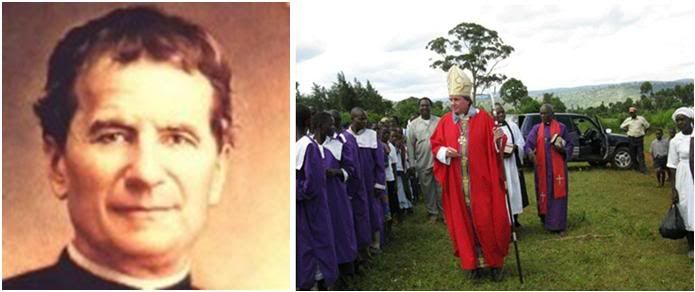 Right photo shows Bishop Hepworth on a trip to Kenya in 2008 to confirm a group of 400 new Christians.
Right photo shows Bishop Hepworth on a trip to Kenya in 2008 to confirm a group of 400 new Christians.
I have spent this evening speaking to bishops, priests and lay people of the Traditional Anglican Communion in England, Africa, Australia, India, Canada, the United States and South America.
We are profoundly moved by the generosity of the Holy Father, Pope Benedict XVI. He offers in this Apostolic Constitution the means for "former Anglicans to enter into the fullness of communion with the Catholic Church".
He hopes that we can "find in this canonical structure the opportunity to preserve those Anglican traditions precious to us and consistent with the Catholic faith".
He then warmly states "we are happy that these men and women bring with them their particular contributions to our common life of faith".
May I firstly state that this is an act of great goodness on the part of the Holy Father. He has dedicated his pontificate to the cause of unity. It more than matches the dreams we dared to include in our petition of two years ago. It more than matches our prayers.
In those two years, we have become very conscious of the prayers of our friends in the Catholic Church. Perhaps their prayers dared to ask even more than ours.
While we await the full text of the Apostolic Constitution, we are also moved by the pastoral nature of the Notes issued today by the Congregation for the Doctrine of the Faith.
My fellow bishops have indeed signed the Catechism of the Catholic Church and made a statement about the ministry of the Bishop of Rome, reflecting the words of Pope John Paul II in his letter "Ut Unum Sint".
Other Anglican groups have indicated to the Holy See a similar desire and a similar acceptance of Catholic faith. As Cardinal Levada has indicated, this response to Anglican petitions is to be of a global character. It will now be for these groups to forge a close cooperation, even where they transcend the existing boundaries of the Anglican Communion.
Fortunately, the Statement issued by the Archbishop of Canterbury reflects the understanding that we have gained from him that he does not stand in our way, and understands the decisions that we have reached.
Both his reaction and our petition are fruits of a century of prayer for Christian unity, a cause that many times must have seemed forlorn.
We now express our gratitude to Archbishop Williams, and have regularly assured him of our prayers. The See of Augustine remains a focus of our pilgrim way, as it was in ages of faith in the past.
I have made a commitment to the Traditional Anglican Communion that the response of the Holy See will be taken to each of our National Synods. They have already endorsed our pathway.
Now the Holy See challenges us to seek in the specific structures that are now available the "full, visible unity, especially Eucharistic communion", for which we have long prayed and about which we have long dreamed. That process will begin at once.
In the Anglican Office of Morning Prayer, the great Hymn of Thanksgiving, the Te Deum, is part of the daily Order. It is with heartfelt thanks to Almighty God, the Lord and Source of all peace and unity, that the hymn is on our lips today.
This is a moment of grace, perhaps even a moment of history, not because the past is undone, but because the past is transformed.
Continuing with the reports on the historic development: Even The Guardian gets no opening to be snarky as it usually is with the Church and the Pope in its report - except perhaps to embaraas the Archbishop of Canterbury:
Roman Catholic Church to receive Anglicans
by Riazat Butt and John Hooper

Oct. 20, 2009
Thousands of Anglicans could defect to the Roman Catholic Church after the Pope today approved a new global institution to receive them.
It will be the first time since the Reformation in the 16th century that entire Protestant communities have reunited with Rome. The first group likely to take advantage of the new rules is the Traditional Anglican Community (TAC), which broke off from the rest of the community in 1991 and claims to have more than 500,000 members worldwide.
Other groups unhappy with developments in the Anglican Communion are also expected to accept the invitation from the Vatican. Traditionalists, including thousands in the Church of England, have long threatened to defect to Rome over issues such as the ordination of women and gay people.
Reflecting the importance of the initiative, the Pope set out the new arrangements in an apostolic constitution, the highest form of pontifical decree, and press conferences were held simultaneously in London and the Vatican to announce it.
In Ecclestone Square, the administrative headquarters of the Catholic Church of England and Wales, the Anglican archbishop of Canterbury and the Catholic archbishop of Westminster sat side by side on the top table in a show of unity, but the choice of location reflected the shift in power.
Both men played down any suggestion of tension brought on by the decision, but the unease became apparent in the question and answer session that followed.
The archbishop of Canterbury, Rowan Williams, informed journalists that he only heard about the apostolic constitution "a couple of weeks ago" and that there was no input from or consultation with Lambeth Palace.
His face reddened as he spoke and, at one point, the archbishop of Westminster, Vincent Nichols, answered questions relating to Williams's leadership and authority.
Williams said: "I do not think this constitution will be seen as in any sense a commentary on Anglican problems offered by the Vatican. It is a response to this range of requests and inquiries from a very broad variety of people, either Anglican or of Anglican heritage. In that sense it has no negative impact on the relations of the communion as a whole to the Roman Catholic church as a whole. It is not an act of aggression, it is not a statement of no confidence. It is business as usual."
Benedict's chief theological adviser [What an inappropriate way to describe Cardinal levada - who would himself be embarassed by it!], the US cardinal William Levada, who heads one of the most important Vatican departments, said the decree had been drawn up "to respond to the numerous requests that have been submitted to the Holy See by groups of Anglican clerics and believers from various parts of the world who wish to enter into full and visible communion" with Rome.
He said that, under the new arrangements, Anglican communities that joined the Catholic Church would be able to keep their own liturgy while remaining outside the existing dioceses. Their pastoral care would be entrusted instead to their own senior prelates, who would not necessarily become Catholic bishops. This is a way around the problem that in the Catholic church, as in the Orthodox churches, married men are not allowed to become bishops.
And the last P.S. from Damian Thompson on his blogathon yesterday:
Lambeth Palace 'implacably opposed'
to Pope's Anglican plans

Oct. 20, 2009
This from a good source in Rome: apparently both Lambeth Palace [i.e., the Archbishop of Canterbury] and elements in the Vatican’s Pontifical Council for Promoting Christian Unity were “implacably opposed” to Pope Benedict XVI’s dramatic new arrangements for Anglicans.
The source also reports speculation that Archbishop Rowan Williams put pressure on Vatican ecumenists to stop the Apostolic Constitution being issued. For all I know, he did persuade Cardinal Kasper, head of the Pontifical Council, that it wasn’t a good idea.
But this particular portfolio was taken out of Kasper’s hands a long time ago; indeed, it looks as if the cardinal was simply “informed” what was happening by the CDF.
The professional ecumenists on both sides had decades to get this right. They screwed it up. So now Pope Benedict has opened up another route to unity: a high-speed bypass.
Cardinal Kasper has yet to express himself about all this, but judging from his persistent 'snarkiness' about the FSSPX matter [which was not an ecumenical matter at all, therefore, out of his hands to begin with], he's not going to be very positive!
But once again, the papal initiative with the returning Anglicans goes above and beyond ecumenism and straight to reunification with Rome of a significant bloc of Anglioans. Kasper's commission is not equipped for this - it is properly the concern of the CDF and its canon law experts.
For the 'professional ecumenists' to object to it in any way is sheer egotism that betrays they are more interested in the process - which is their work - than in the actual end, concrete reunification for some at least. It does not in any way impede the ecumenical dialog/process from continuing; it should, in fact, provide it with new momentum.
[Modificato da TERESA BENEDETTA 22/10/2009 10:25] |
| |
 21/10/2009 13:07 21/10/2009 13:07 |
|
| | | OFFLINE | | Post: 18.679
Post: 1.327 | Registrato il: 28/08/2005
Registrato il: 20/01/2009 | Administratore | Utente Veteran | |
|

 Surprisingly, the news about the Pope's initiative towards the Anglicans is very much downplayed in the Oct. 21 issue of L'Osservatore Romano - it gets a teaser paragraph on Page 1, at the bottom of the page, directing the reader to Page 8 (the last page of the usual single issue), which contains both the Note from the CDF and the joint statement by the Archbishops of Westminster and Canterbury.
Surprisingly, the news about the Pope's initiative towards the Anglicans is very much downplayed in the Oct. 21 issue of L'Osservatore Romano - it gets a teaser paragraph on Page 1, at the bottom of the page, directing the reader to Page 8 (the last page of the usual single issue), which contains both the Note from the CDF and the joint statement by the Archbishops of Westminster and Canterbury.
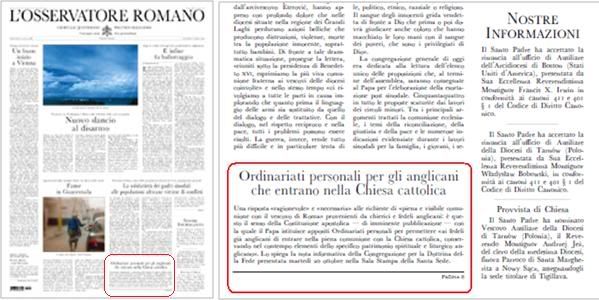 Here is the news report that introduces the documents:
Informative note on personal Ordinariates
Here is the news report that introduces the documents:
Informative note on personal Ordinariates
for Anglicans presented:
Apostolic Constitution published in two weeks
Translated from
the 10/21/09 issue of

An Apostolic Constitution on Personal Ordinariates for Anglicans entering the Catholic Church will be published soon.
The announcement was made by Cardinal William Levada, Prefect of the Congregation for the Doctrine of the Faith, Tuesday morning, Oct. 20, at a news conference in the Vatican Press Office. Also present was Archbishop Joseph Augustine DiNoia, secretary of the Congregation for Divine Worship and the Discipline of Sacraments.
The Pope's initiative, explained the cardinal, is a response to "the numerous requests that have come from various groups of Anglican clergy and faithful from different parts of the world".
Asked to be more specific by a newsman, the cardinal estimated that "about 30 Anglican bishops are among the principal promoters of the request".
He was them asked if the Apostolic Constitution could have any effect on the coming conversations with the Lefebvrians which will start on Monday, Oct. 26.
The cardinal - starting his response with the remark that he was speaking in his role as both prefect of the CDF and president of the Ecclesia Dei Pontifical Commission - replied that it was simply a coincidence in time, "because when we were preparing the document, we were certainly not thinking of the FSSPX".
He then pointed out that the provision for the Anglicans who wish to join the Catholic Church was done with the approval of the Anglican Communion under Archbishop Rowan Williams "who has consented to the operation", and that "at the same time we atarted this news conference, a similar one is taking place in London to present the initiative".
International news agencies have reported that the Archbishop of Canterbury has stated that the Vatican decision was not interpreted in the light of the internal problems of the Anglican Communion, but was a response to requests from individual Anglicans.
In this sense, Archbishop Williams stressed, the document will not have any negative impact on relations between the Anglican Communion adn the Catholic Church.
Cardinal Levada, answering a question about the ordination of women and homosexual priests, said that "if these problems [in the Anglican Church] did not exist, we would probably be much nearer [in the ecumenical sense]. But this does not represent in any way a diminution of our ecumenical commitment".
Archbishop DiNoia framed the initiative in th wake of Vatican-II and noted that even this new step in the ecumenical journey is an impulse from the Holy Spirit, just as all the other initiatives for proceeding with ecumenical dialog "according to Christ's will".
Asked what motivated the Anglicans to request to join the Catholic Church, Cardinal Levada said there were about a hundred Anglican bishops who said that they already feel Catholic and wished to join the Church, also declaring that they accept the Petrine ministry as an element instituted by Christ for his Church.
Cardinal Levada said that the forthcoming Apostolic Constitution was only specific for Anglicans, and would not apply to other Protestant confessions, and certainly not to Catholic priests who have left their ministry to get married.
Asked when the Apostolic Constitution would be published, the cardinal said it would take another two weeks to finalize the draft document which he had on hand.
I think the downplay of the story in OR is an act of ecumenical courtesy - so as not to appear to be flaunting what is clearly a potential if not already actual loss to a sister 'church' [actually, a daughter church) with consequent gain for Rome.
[Modificato da TERESA BENEDETTA 22/10/2009 11:33] |
| |
 21/10/2009 13:28 21/10/2009 13:28 |
|
| | | OFFLINE | | Post: 18.680
Post: 1.328 | Registrato il: 28/08/2005
Registrato il: 20/01/2009 | Administratore | Utente Veteran | |
|

 Wednesday, Oct. 21
Wednesday, Oct. 21
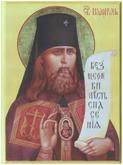 ST. HILARION (born near Gaza, 291, died in Cyprus 371)
ST. HILARION (born near Gaza, 291, died in Cyprus 371)
Anchorite
Educated in Egypt with St. Anthony Abbot,
lived as a hermit in Palestine, then settled in Cyprus
where he died. St. Jerome wrote his biography.
OR today.
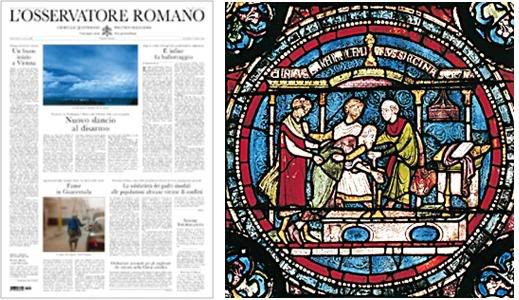
The news on Pope Benedict's initiative towards Anglicans is very much downplayed on Page 1, as
a brief item at the bottom of the page indicating there are two items in the inside pages about
'Personal ordinariates for Anglicans who enter the Catholic Church' One item is the CDF note,
the other the joint statement by the Archbishops of Westminster and Canterbury. Page 1 stories:
Runoff elections in Afghanistan set for Nov. 7; Synodal fathers express solidarity with victims
of African conflicts as they consider the list of Synodal propositions to be voted on; and
two headlines accentuating the positive - what little there is - about the meeting in Vienna on
Iran's nuclear program, and the US-Russia intention to pursue a new round of reduction in their
nuclear arms stockpiles. Also a teaser for an article in the inside pages by the Israeli ambassador
to the Holy See who explains why the Jews use the term Shoah rather than the Jewish equivalent
of 'holocaust'.
THE POPE'S DAY
General Audience today - The Holy Father's catechesis was on St. Bernard of Clairvaux, Doctor of the Church.
After the GA, the Holy Father met with
- H.E. Nasser Judeh, Foreign Minister of Jordan.
The Vatican also announced that the Holy Father has named
- Mons. Manuel Monteiro de Castro, titular Archbishop of Benevento, Secretary of the Congregation for Bishops,
as Secretary for the College of Cardinals. (The single-sentence announcement does not make clear if he will hold both
positions simultaneously.)
[Modificato da TERESA BENEDETTA 22/10/2009 11:27] |
| |
 21/10/2009 14:22 21/10/2009 14:22 |
|
| | | OFFLINE | | Post: 18.681
Post: 1.329 | Registrato il: 28/08/2005
Registrato il: 20/01/2009 | Administratore | Utente Veteran | |
|

 THE DAY AFTER
For the rest of the world that still depends on newspapers for their news, yesterday's historic news is in the Oct. 21 editions for them to read. I will post the more significant and interesting reports and commentaries.
THE DAY AFTER
For the rest of the world that still depends on newspapers for their news, yesterday's historic news is in the Oct. 21 editions for them to read. I will post the more significant and interesting reports and commentaries.
Beginning with the Christian Science Monitor, which is unequivocal and precise about its historic significance.
Vatican welcome to Anglicans
boldest move since Reformation
by Nick Squires

Vatican City, Oct. 20 - The Vatican launched an historic initiative Tuesday to make it easier for disgruntled Anglicans worldwide to join the Roman Catholic Church. The Church said the move was not a swipe at the Anglicans but it could nevertheless result in hundreds of thousands of churchgoers unhappy with openly gay and female clerics defecting to Rome.
Pope Benedict XVI gave his approval to a new framework to bring back into the fold Anglicans who oppose their church's liberal stance on gay marriage and the ordination of women priests and gay bishops while allowing them to retain some of their separate religious traditions.
The move comes nearly 500 years after Henry VIII's desire for a divorce led him to break with Rome and proclaim himself as the head of the newly formed Church of England in 1534.
The framework is the Vatican's most sweeping gesture toward any schismatic church since the Protestant Reformation in the 16th century and the Thirty Years' War that followed it in the 17th century.
That war ended with the Peace of Westphalia in 1648, which acknowledged the right of monarchs rather than the Vatican to determine their national faiths, prompting Pope Innocent X to declare the document "null, void, invalid, iniquitous, unjust, damnable, reprobate, inane, empty of meaning and effect for all time."
Over the centuries, relations between the various Christian faiths have improved and both Anglican and Catholic leaders were at pains on Tuesday to say that warming relations between the two churches will not be affected by the new plan.
But both churches have been struggling to retain adherents in recent years, particularly in the developed world, with poorer countries their only growth spots.
Individual Anglicans have long been free to convert to Catholicism, as former British prime minister Tony Blair did after leaving office in 2007. But the so-called Apostolic Constitution will enable entire Anglican communities to transfer their allegiance en masse.
The Pope was responding to "numerous requests to the Holy See from groups of Anglican clergy and faithful in various parts of the world who want to enter into full and visible communion" with the Catholic Church, Cardinal William Joseph Levada told a news conference. He is the American head of the Vatican's doctrinal body.
Vatican officials declined to say how many of the world's 77 million Anglicans might take the opportunity to convert to Catholicism.
The Traditional Anglican Communion, a vocal group of 400,000 conservatives who split from the Anglican Communion in 1991, are expected to move towards Rome.
"We have had requests from large groups, in the hundreds," said Cardinal Levada. "If I had to say a number of bishops, I would say it's in the twenties or thirties."
His American colleague, Archbishop Joseph Di Noia, Secretary of the Congregation for Divine Worship and the Discipline of the Sacraments, said after the press conference that he believed the number of bishops ready to convert was closer to 50.
They would come from the United States, Australia, and the island nations of the Pacific, he said.
Cardinal Levada was asked whether the Vatican's new policy weakened the Anglican Church's standing.
"I would not dare to make a comment on that. After the long years of the British Empire, and the work of Anglican missionaries, the Anglican Communion is a diverse and very varied worldwide communion."
Under the new constitution, married Anglican priests will be allowed to enter the Catholic Church but will not be ordained as bishops.
The initiative was in response to years of lobbying by Anglicans who had become disenchanted with Anglican liberalism, a dissatisfaction which reached a crisis point in 2004 when the Episcopal Church in the United States ordained the first openly gay bishop, Gene Robinson of New Hampshire.
That move and other liberal shifts, such as a Canadian diocese's willingness to bless same-sex unions, have been fiercely opposed by more conservative Anglicans, particularly in Africa.
The new framework was announced simultaneously in Rome and in London, where the head of the Church of England, Archbishop of Canterbury Rowan Williams, said he did not see the Vatican move as "an act of aggression."
Neither was it a vote of no confidence in the Anglican Church, he said, but a sign of maturity and understanding between the two faiths.
But Vatican commentators described it as a blow to the Anglican Communion. "For people who harbor the vision of Anglican unity, this will be a great disappointment," said Vatican analyst Francis X Rocca, of the Religion News Service.
"But it may also help to let off steam within the Anglican Church. If disaffected traditionalists leave, then they will lower the tensions over issues like gay marriage and women clergy."
Vatican expert John Allen of the National Catholic Reporter wrote in a blog post that while the opening by the Vatican had long been rumored, some Catholics feared "potentially negative repercussions in relations with the Anglican Communion – whose leadership might see it as 'poaching.'"
[That tired and patently fallacious argument again! Disaffected Anglicans knocked, and the Church is opening its doors. The readiness of the 400,000-strong TAC to move en masse to the Catholic Church is the best argument against the absurd idea that the Church is 'poaching'.]
BTW, I am still waiting for some commentator to call this initiative by Benedict XVI as the most signigificant papal initiative since John XXIII decided to convoke the Second Vatican Council. Doesn't it send shivers down your spine to think of it?
In many ways, Benedict XVI has been building on the good fruits of the Council of Trent which was the Church's strongest action in thw Counter-Reformation, and which was a fecund renewal of tradition, as well as on the good fruits of Vatican II, which was the Church's way of fitting into the modern world - in keeping with his view of the Church as an 'ecclesia semper riformanda' and a continuum in time.
[Modificato da TERESA BENEDETTA 21/10/2009 14:41] |
| |
|
|
|
|